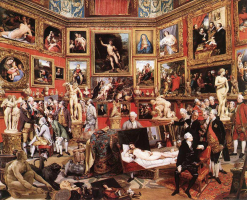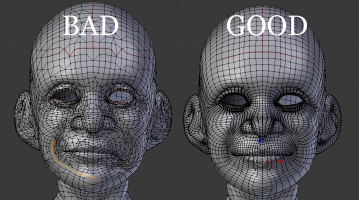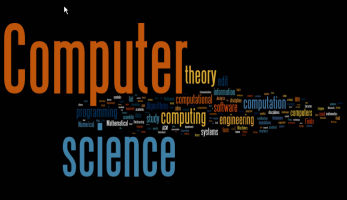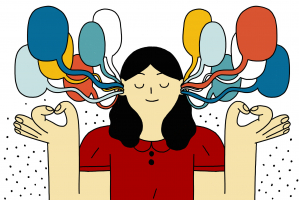Top 15 Best Books On Cultural History
Military wars, empire, and legal papers are only a small part of history. Culture, in all of its manifestations—art, nature, technology, architecture, ... read more...medicine, and so on—is at the heart of everything, creating the foundation for civilization. And, while culture can be a source of conflict and even create it, it is its own notion that develops and evolves over time. Here are the best books on cultural history that will broaden your understanding of the rapidly changing world around us.
-
Yuval Noah Harari is a bestselling author of Sapiens: A Brief History of Humankind, Homo Deus: A Brief History of Tomorrow, 21 Lessons for the Twenty-First Century, and Sapiens: A Graphic History. His works have sold over 35 million copies worldwide in 65 languages, and he is widely regarded as one of the world's most important public intellectuals today. According to The Guardian, Sapiens is credited with transforming the non-fiction market and popularizing "brainy books."
A groundbreaking narrative of humanity's creation and evolution—a #1 international bestseller—from a renowned historian that explores the ways in which biology and history have defined us and enhanced our understanding of what it means to be "human." At least six different species of humans inhabited Earth one hundred thousand years ago. Today, however, there is only one—Homo sapiens. What became of the others? What might happen to people?
Most works on the history of humanity use either a historical or a biological approach, but Dr. Yuval Noah Harari deviates from the norm with this very innovative work, which begins around 70,000 years ago with the advent of modern intellect in Sapiens: A Brief History of Humankind. Sapiens blends history and science to reassess traditional narratives, connect previous developments with modern challenges, and study individual events within the framework of bigger ideas, from evaluating the role of evolving humans in the global ecosystem to chronicling the emergence of empires. Dr. Harari also requires us to look ahead, because people have begun to bend natural selection laws that have governed life for the past four billion years in the last few decades.
We are learning to design not only the world around us, but also ourselves. Where are we going, and what do we wish to become? This intriguing and incisive work, one of the best books on cultural history, which includes 27 images, 6 maps, and 25 illustrations/diagrams, is guaranteed to stimulate debate and is required reading for fans of Jared Diamond, James Gleick, Matt Ridley, Robert Wright, and Sharon Moalem.
Author: Yuval Harari
Link to buy: https://www.amazon.com/Sapiens-Humankind-Yuval-Noah-Harari/dp/0062316117/
Ratings: 4.6 out of 5 stars (from 63393 reviews)
Best Sellers Rank: #714 in Books
#1 in General Anthropology
#2 in History of Civilization & Culture
#3 in Evolution (Books)
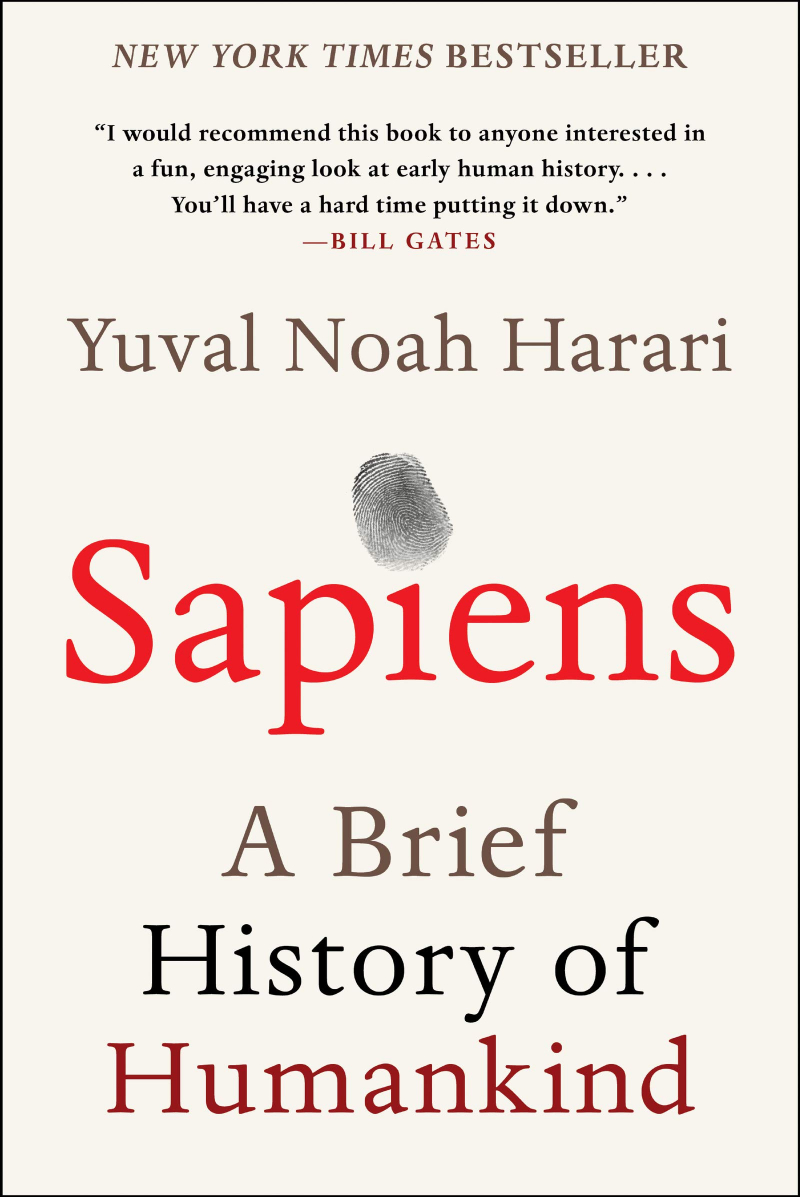
https://www.amazon.com/ 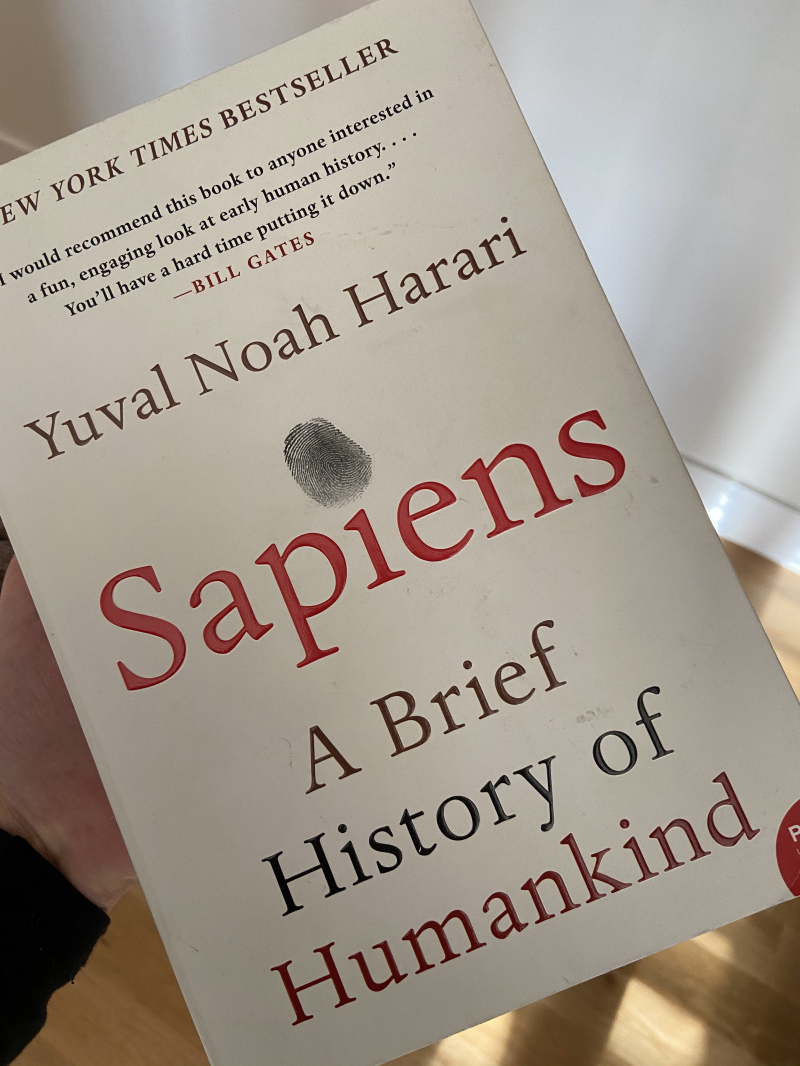
https://www.amazon.com/ -
David Graeber was an anthropology professor at the London School of Economics. He is the author of many books, including Debt: The First 5,000 Years and Bullshit Jobs: A Theory, and the co-author of the New York Times bestseller The Dawn of Everything with David Wengrow. His early activities in Zuccotti Park helped to establish Occupy Wall Street as an era-defining movement. He passed away on September 2, 2020.
David Wengrow is a comparative archaeology professor at University College London's Institute of Archaeology and a visiting professor at New York University. He has written several works, including What Causes Civilization? Wengrow has conducted archaeological investigations in Africa and the Middle East.
For years, our distant forefathers have been portrayed as unsophisticated and infantile, either as free and equal innocents or as thuggish and warlike. Civilization, we are told, can only be attained by either relinquishing those fundamental liberties or taming our baser instincts. David Graeber and David Wengrow demonstrate how, in the eighteenth century, such beliefs evolved as a conservative reaction to forceful critiques of European civilization given by Indigenous observers and intellectuals. This interaction has far-reaching ramifications for how we understand human history today, including the origins of farming, property, cities, democracy, slavery, and civilization itself.
Drawing on groundbreaking archaeology and anthropology studies, the authors demonstrate how history becomes a considerably more exciting place once we learn to let go of our conceptual shackles and recognize what is truly there. What were humans doing all that time if they didn't spend 95 percent of their evolutionary history in small bands of hunter-gatherers? If agriculture and cities did not result in a fall into hierarchy and dominance, what types of social and economic organization did they produce? The replies are frequently unexpected, implying that the course of human history may be less predetermined and more full of playful, hopeful possibilities than we commonly believe.
The Dawn of Everything significantly alters our understanding of human history and opens the door to conceptualizing new types of liberty and new ways of organizing society. This is a massive book with a great intellectual breadth, propelled by curiosity, moral vision, and belief in the potential of direct action.
Author: David Graeber and David Wengrow
Link to buy: https://www.amazon.com/Dawn-Everything-New-History-Humanity/dp/0374157359/
Ratings: 4.5 out of 5 stars (from 3451 reviews)
Best Sellers Rank: #756 in Books
#2 in Slavery & Emancipation History
#3 in History of Civilization & Culture
#4 in Evolution (Books)
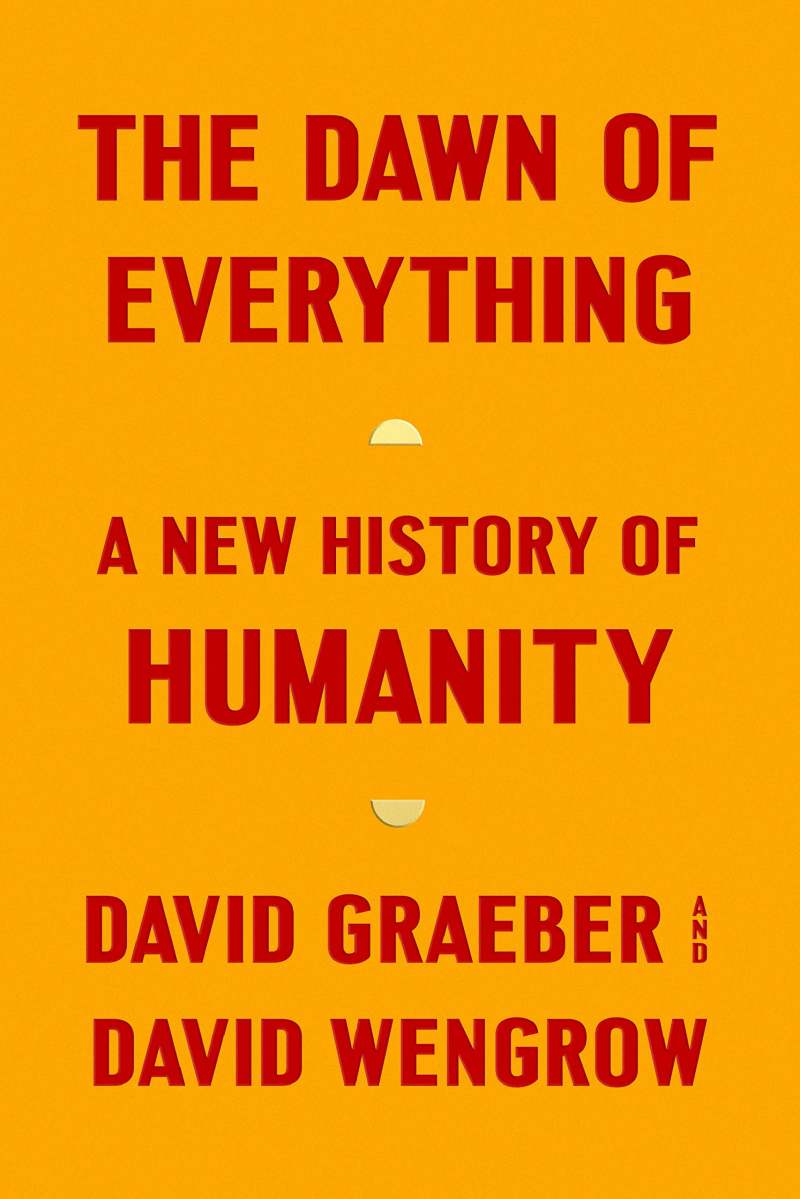
https://www.amazon.com/ 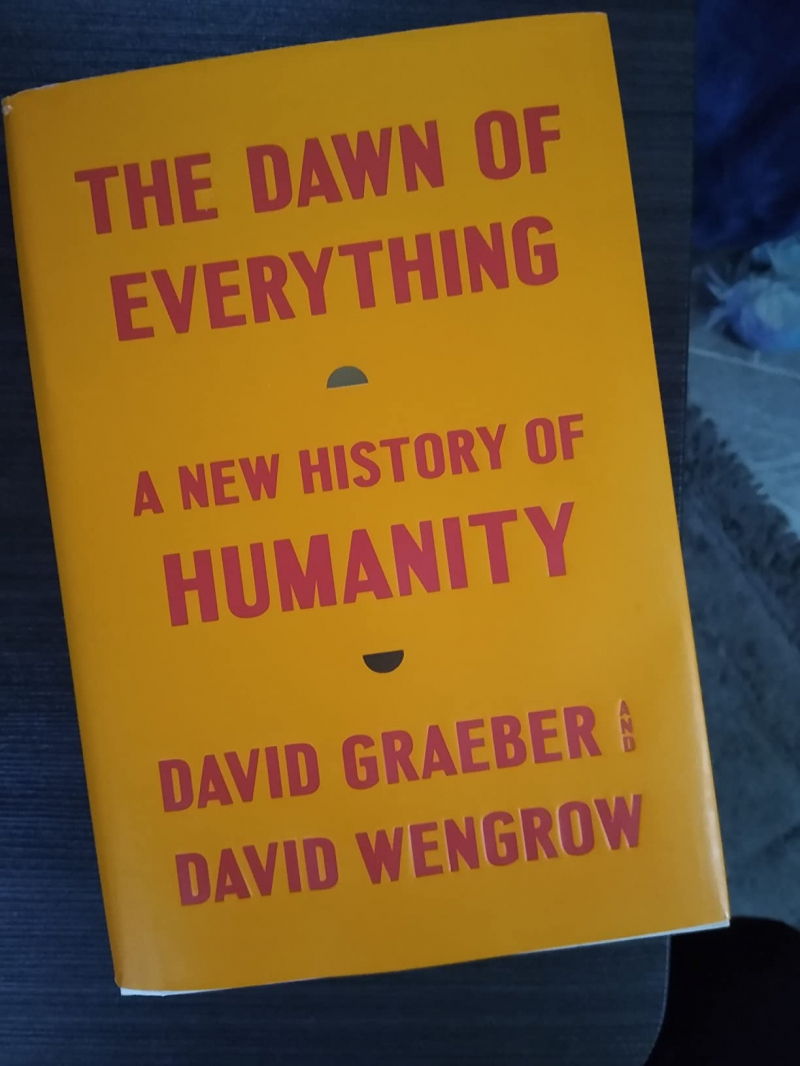
https://www.amazon.com/ -
Jared Diamond is a UCLA geography professor and the best-selling author of Collapse and The Third Chimpanzee. He is a MacArthur Fellow and a National Medal of Science recipient.
Why didn't Eurasians conquer, displace, or decimate Native Americans, Australians, and Africans? In this "artful, insightful, and fascinating" (William H. McNeill, New York Review of Books) book, evolutionary biologist Jared Diamond deconstructs racist interpretations of human history by exposing the environmental causes that are actually responsible for its biggest patterns.
The story begins 13,000 years ago, when the whole human population was made up of Stone Age hunter-gatherers. Around that time, the evolutionary paths of human societies on various continents began to diverge dramatically. Early domestication of wild plants and animals in the Fertile Crescent, China, Mesoamerica, the Andes, and other areas provided a head start for the peoples of those countries. However, the limited origins of farming and herding were only part of the explanation for their disparate destinies. Other aspects of climate and geology, such as the various sizes, positions, and even shapes of the continents, influenced the unequal rates at which food production spread from those original hubs. Only communities that progressed beyond the hunter-gatherer stage developed writing, technology, administration, and structured religions, as well as lethal viruses and powerful weapons of war. It was those societies that invaded others by water and land, decimating original inhabitants through slaughter and disease spread.
Guns, Germs, and Steel is a seminal work in our knowledge of human societies, chronicling the birth of the modern world and its disparities. The book is among the best books on cultural history.
Author: Jared Diamond Ph.D.
Link to buy: https://www.amazon.com/Guns-Germs-Steel-Fates-Societies/dp/0393354326/
Ratings: 4.5 out of 5 stars (from 8291 reviews)
Best Sellers Rank: #3,043 in Books
#2 in Crop Science (Books)
#3 in Human Geography (Books)
#3 in General Anthropology
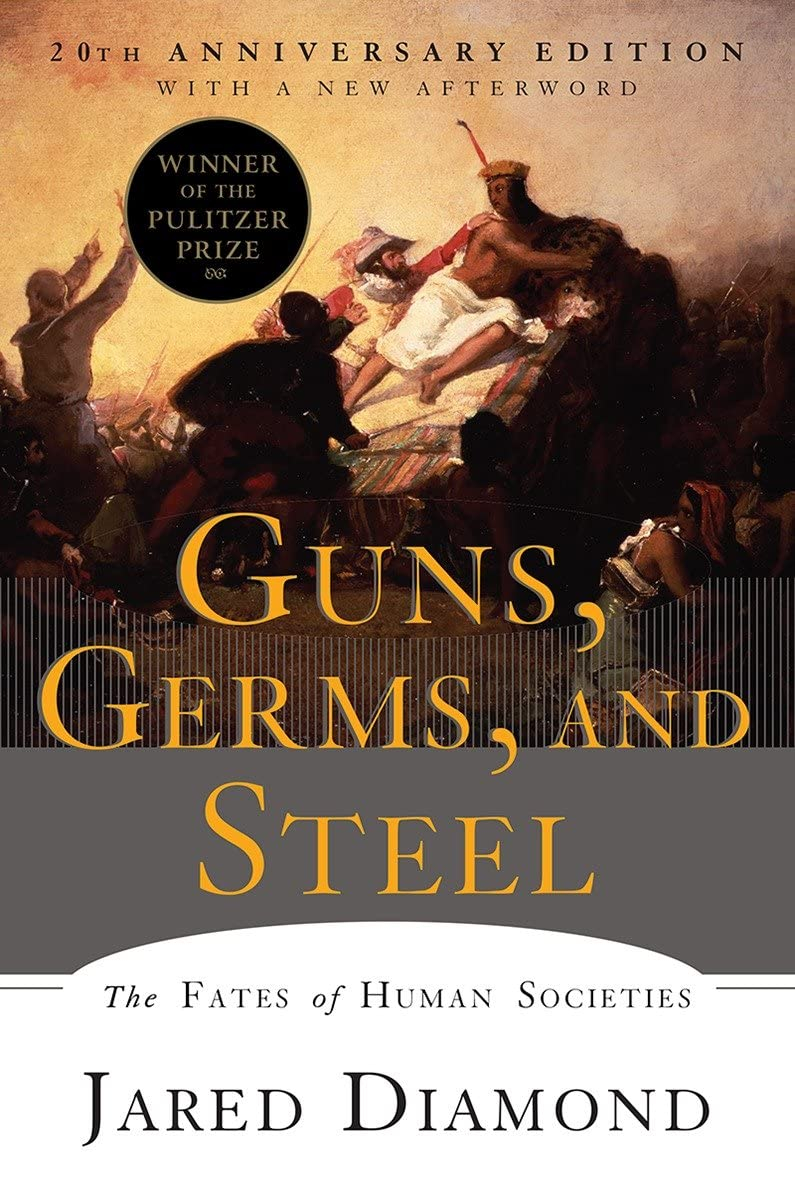
https://www.amazon.com/ 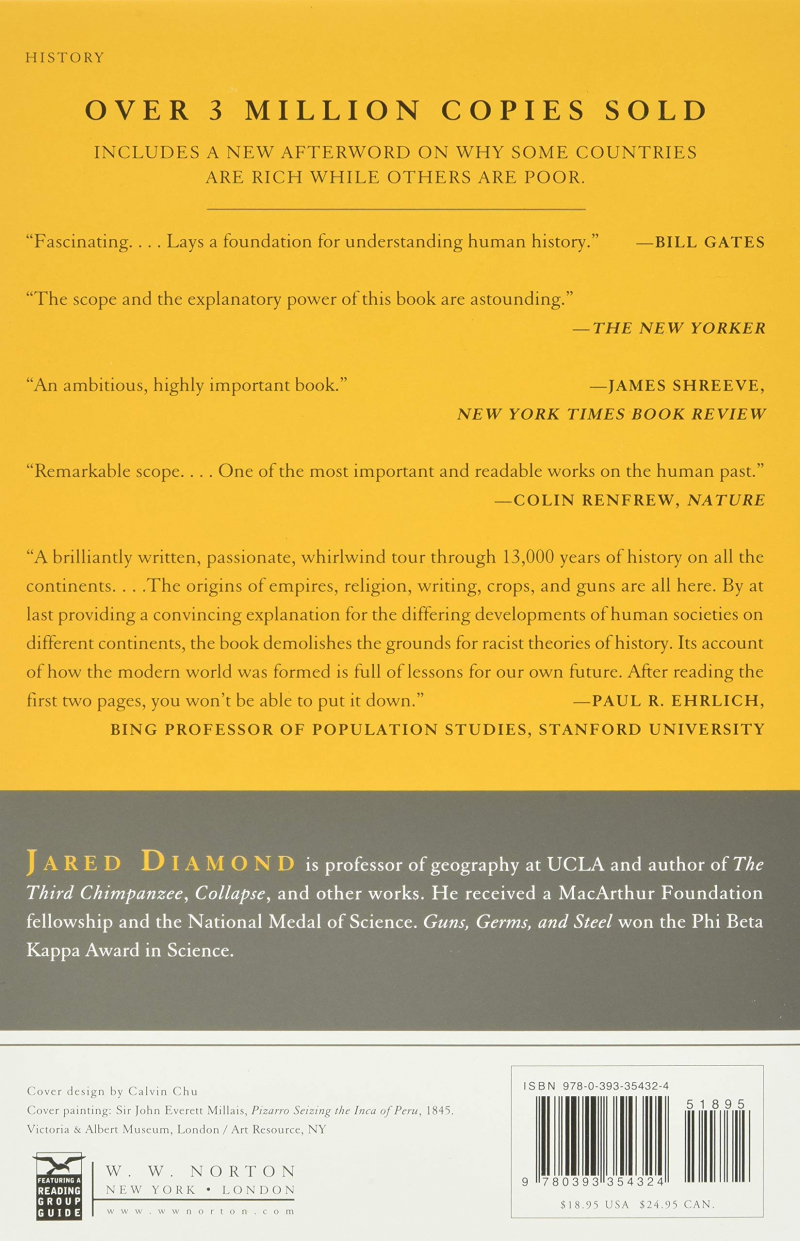
https://www.amazon.com/ -
J. Warner Wallace is a homicide detective who has appeared on Dateline, a renowned national speaker, and a best-selling author. Wallace, who has over two decades of investigative experience, gives the tools needed to analyze Christian claims and establish a convincing case for the truth of the Christian worldview.
Can the truth about Jesus be discovered even in the absence of a body or a crime scene? J. Warner Wallace, popular author and cold-case detective, examines Jesus using an original and unique approach he uses to solve real missing person murder cases.
Wallace thoroughly sifts through the facts in Person of Interest without relying on the New Testament. You'll realize how Jesus, the most important figure in history, altered the world like never before.
Features:
- Join a cold-case investigator as he uses the same method he used to solve real murder cases to unearth the truth about Jesus.
- As you study why Jesus still important today, marvel at how Jesus revolutionized the world.
- Learn how to apply a creative and one-of-a-kind "fuse and fallout" investigative approach that you can also use to investigate other historical claims.
- Investigate and learn how to answer to typical Christian objections.
Wallace was suspicious of the Bible, but he'd looked into several no-body homicides where there was no crime scene, no physical proof, and no victim's body. Could Jesus' historical life and acts be studied in the same way?
Wallace outlines his own personal investigative journey from atheism to Christianity in Person of Interest as he carefully evaluates the evidence. Person of Interest, a creative, intriguing, and fully illustrated book, will enhance believers' faith while engaging others who are suspicious and distrustful of the New Testament.
Author: J. Warner Wallace
Link to buy: https://www.amazon.com/Person-Interest-Jesus-Matters-Rejects/dp/0310111277/
Ratings: 4.9 out of 5 stars (from 1227 reviews)
Best Sellers Rank: #3,450 in Books
#8 in Christian Church History (Books)
#9 in Christian Apologetics (Books)
#12 in History of Christianity (Books)
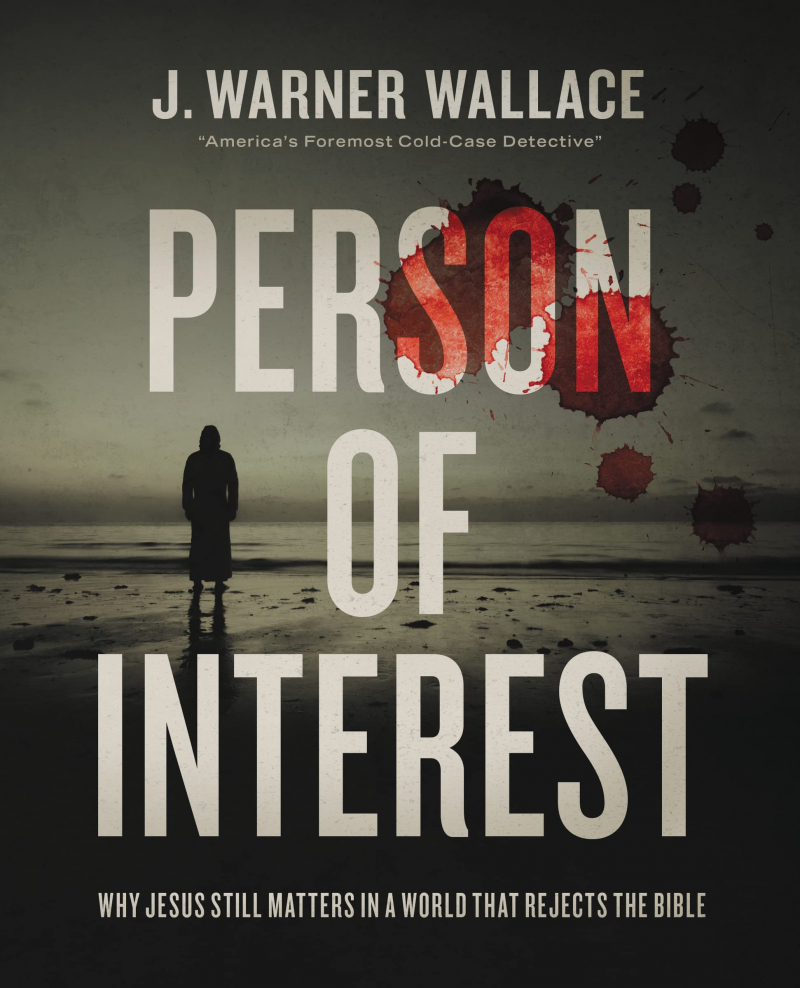
https://www.amazon.com/ 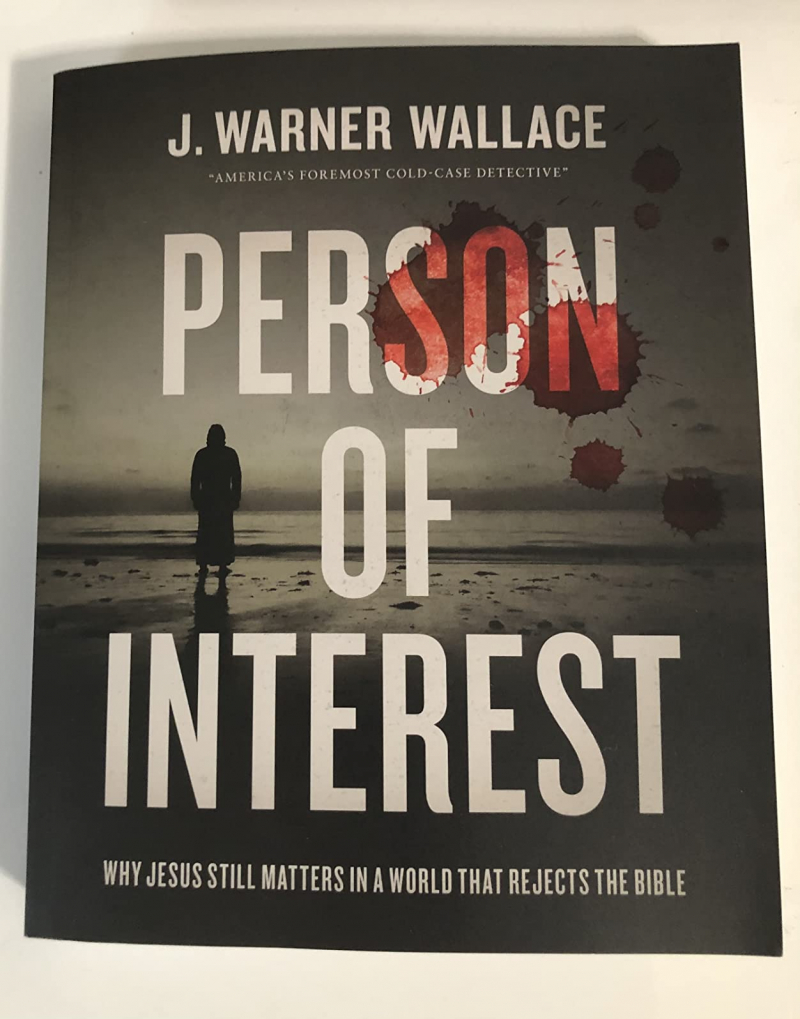
https://www.amazon.com/ -
Graham Hancock formerly worked as The Economist's East Africa correspondent and as a London Sunday Times correspondent. His international best-seller The Sign and the Seal chronicled his real-life hunt for the Ark of the Covenant. He has been on TV alongside Michael Palin in his Pole to Pole series, as well as on the BBC, CNN, and National Geographic's Explorer series.
In Fingerprints of the Gods, Hancock embarks on a global journey to piece together the huge and fascinating puzzle of humanity's secret past. He discovers not only the clear fingerprints of an as-yet-unidentified civilization of remote antiquity, but also startling evidence of its vast sophistication, technological advancement, and evolved scientific knowledge in ancient monuments as disparate as Egypt's Great Sphinx, the strange Andean ruins of Tihuanaco, and Mexico's awe-inspiring Temples of the Sun and Moon.
Fingerprints of the Gods, a record-breaking number one book in the United Kingdom, holds the seeds of an intellectual revolution, a major and irreversible shift in how we view our past—and thus our future.
And Fingerprints of the Gods tells us something else. As we learn more about prehistory and the true meaning of ancient myths and monuments, it becomes clear that we have been given a warning, a warning of a dreadful calamity that afflicts the Earth in huge cycles at irregular intervals of time—a cataclysm that may be about to reoccur. The book is regarded as one of the best books on cultural history.
Author: Graham Hancock
Link to buy: https://www.amazon.com/Fingerprints-Gods-Graham-Hancock/dp/0517887290/
Ratings: 4.7 out of 5 stars (from 2771 reviews)
Best Sellers Rank: #4,250 in Books
#1 in Prehistory
#1 in Mayan History (Books)
#1 in Ancient Egyptians History
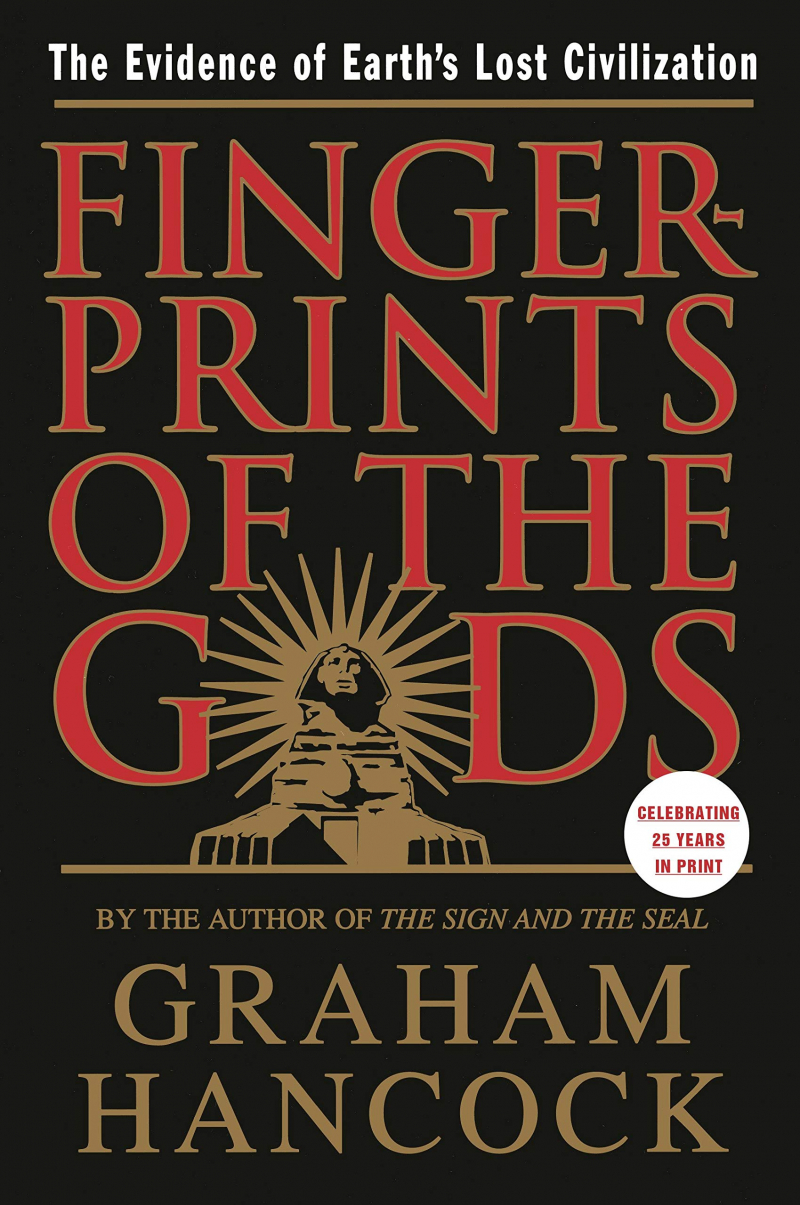
https://www.amazon.com/ 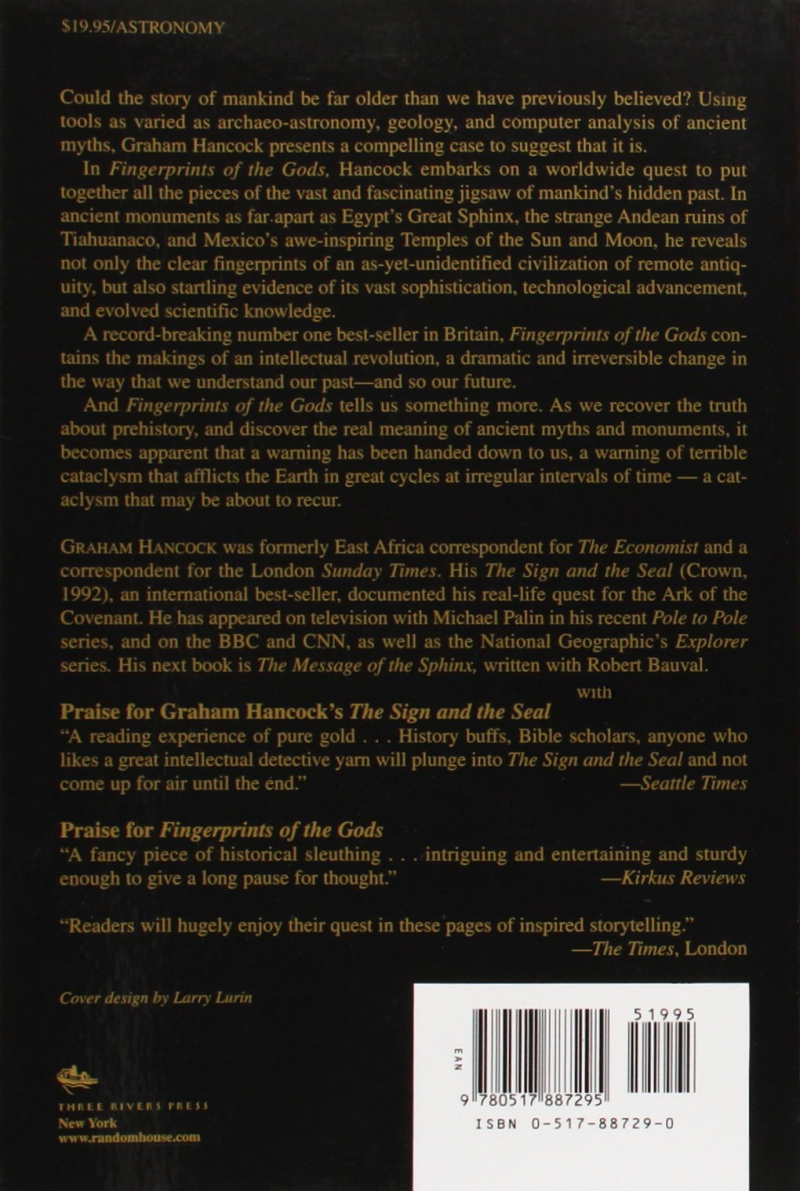
https://www.amazon.com/ -
Edward Slingerland is Distinguished University Scholar and Professor of Asian Studies at the University of British Columbia, as well as Co-Director of the Centre for the Study of Human Evolution, Cognition, and Culture and Director of the Database of Religious History. Slingerland is the author of Trying Not to Try, which was selected one of the finest books of 2014 by The Guardian and Brain Pickings and was featured in the New York Times by John Tierney.
While there have been many interesting books written about the history of alcohol and other intoxicants, none have provided a thorough, persuasive answer to the fundamental question of why people want to become high in the first place.
Drunk deftly cuts through the tangle of urban tales and anecdotal impressions that surround our ideas of drunkenness to present the first rigorous, scientifically-backed explanation for our addiction to alcohol. Drunk demonstrates, using evidence from archaeology, history, cognitive neuroscience, psychopharmacology, social psychology, literature, and genetics, that our taste for chemical intoxicants is not, as we are frequently taught, an evolutionary blunder. In fact, drunkenness aids in the resolution of a number of uniquely human problems, including increasing creativity, relieving stress, fostering trust, and performing the miraculous feat of persuading strongly tribal primates to work with strangers. Our urge to get intoxicated, as well as the individual and collective benefits afforded by drunkenness, aided in the emergence of the first large-scale societies. Without intoxication, there would be no civilisation.
Drunk is crammed with fascinating case studies and engaging research, as well as practical applications for individuals and societies, ranging from invading Vikings and bacchanalian orgies to sex-starved fruit flies, blind cave fish, and problem-solving birds. The result is an enthralling and long-overdue inquiry of humanity's oldest vice—one that explains not just why we desire to get drunk, but also why it can be beneficial to us to do so now and then.
Author: Edward Slingerland
Link to buy: https://www.amazon.com/Drunk-Sipped-Danced-Stumbled-Civilization-ebook/dp/B08KQ18XLF/
Ratings: 4.4 out of 5 stars (from 458 reviews)
Best Sellers Rank: #7,463 in Kindle Store
#1 in Evolutionary Psychology (Kindle Store)
#1 in Ancient Mesopotamia History
#2 in Assyria, Babylonia & Sumer History
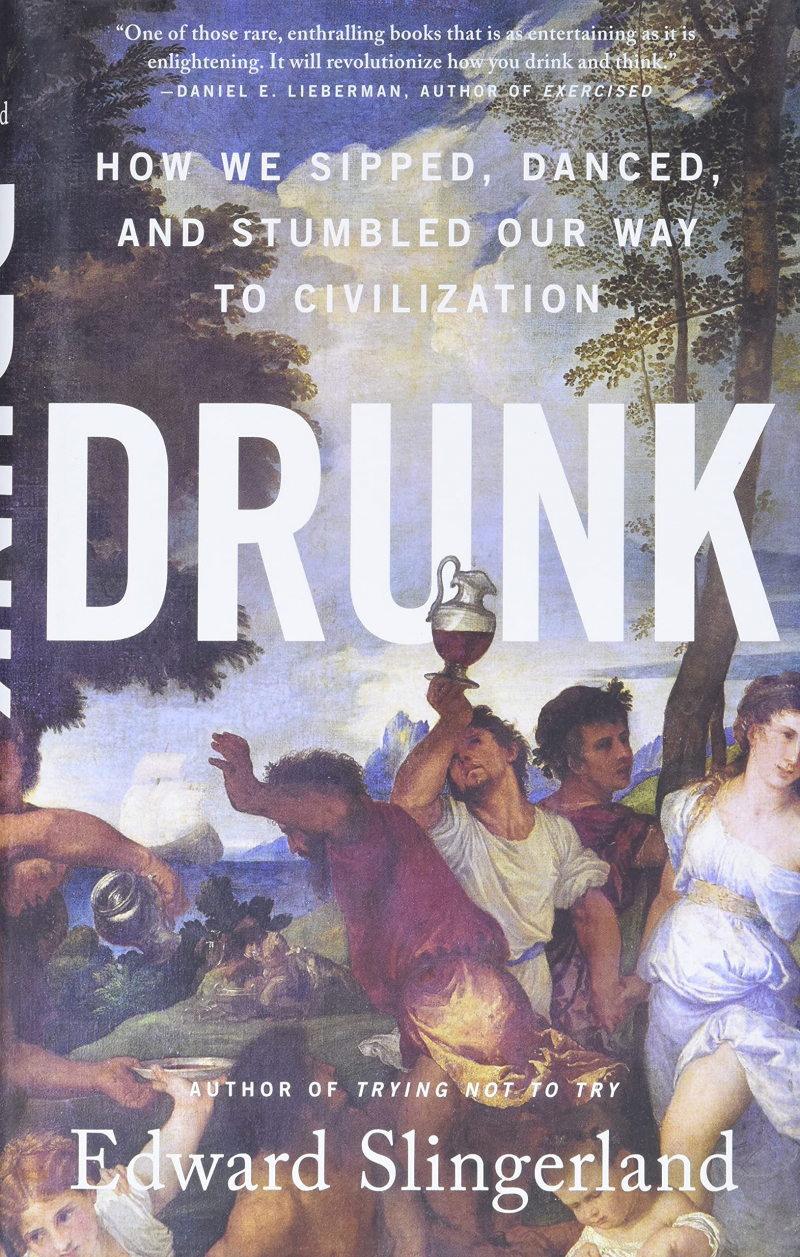
https://www.amazon.com/ 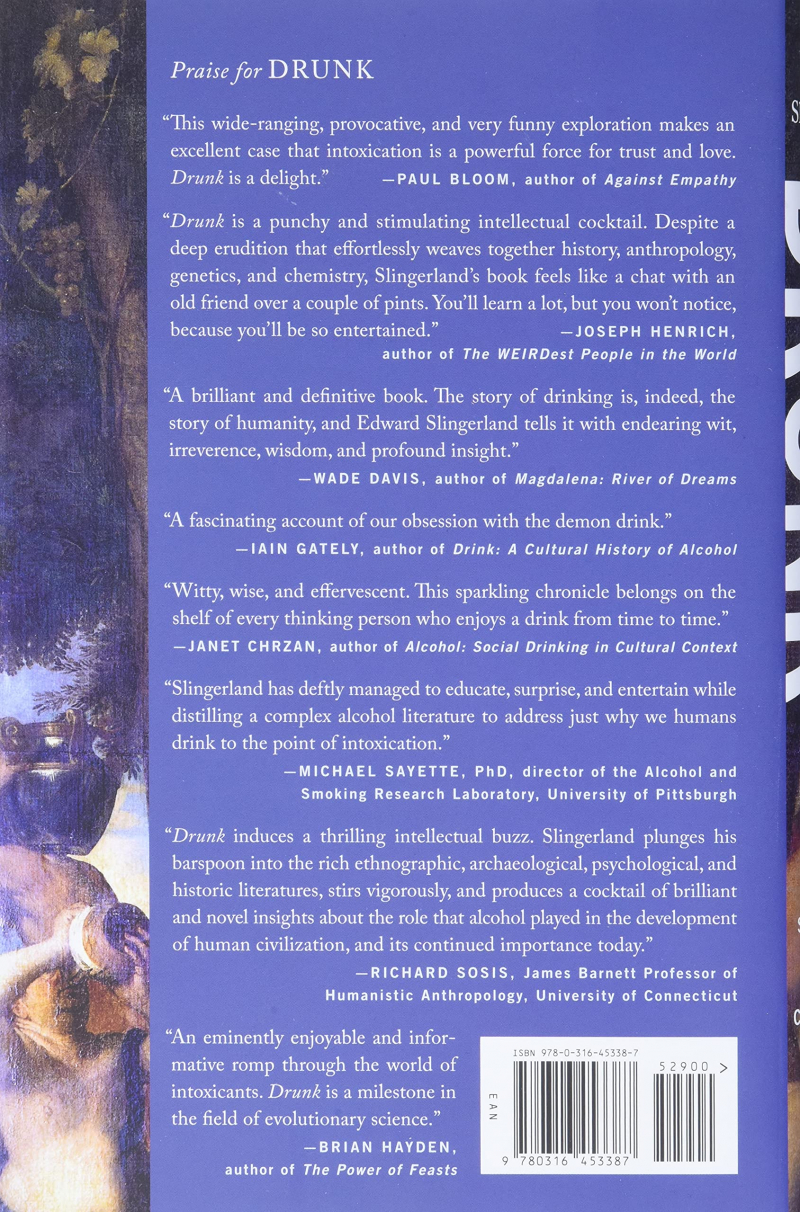
https://www.amazon.com/ -
Yuval Noah Harari is a bestselling author of Sapiens: A Brief History of Humankind, Homo Deus: A Brief History of Tomorrow, 21 Lessons for the Twenty-First Century, and Sapiens: A Graphic History. His works have sold over 35 million copies worldwide in 65 languages, and he is widely regarded as one of the world's most important public intellectuals today. According to The Guardian, Sapiens is credited with transforming the non-fiction market and popularizing "brainy books."
Yuval Noah Harari, author of the highly acclaimed New York Times bestseller Sapiens and international phenomenon, returns with an equally unique, fascinating, and challenging book, this time focusing on humanity's destiny and our drive to elevate people to godhood.
Over the last century, humanity has accomplished the impossible by containing famine, plague, and conflict. This may sound difficult to comprehend, but as Harari explains in his signature comprehensive, yet compelling approach, famine, pestilence, and war have been converted from inexplicable and uncontrolled natural forces into manageable tasks. For the first time in history, eating too much kills more people than eating too little; old age kills more people than contagious diseases; and suicide kills more people than soldiers, terrorists, and criminals combined. The average American is a thousand times more likely to die from a McDonald's binge than from an Al Qaeda bombing.
So, what will take the place of famine, plague, and conflict at the top of the human agenda? What destinies will we set for ourselves as self-made gods of planet Earth, and what journeys will we undertake? From transcending death to creating artificial life, Homo Deus delves into the ambitions, dreams, and nightmares that will influence the twenty-first century. It poses fundamental questions such as, "Where do we go from here?" And how will we save this fragile world against our own destructive forces? This is the next evolutionary stage. This is called Homo Deus.
Harari draws out our future with the same intelligence and clarity that made Sapiens an international sensation and a New York Times bestseller.
Author: Yuval Noah Harari
Link to buy: https://www.amazon.com/Homo-Deus-Brief-History-Tomorrow/dp/0062464345/
Ratings: 4.6 out of 5 stars (from 15941 reviews)
Best Sellers Rank: #5,188 in Books
#21 in History of Civilization & Culture
#35 in Evolution (Books)
#313 in Social Sciences (Books)
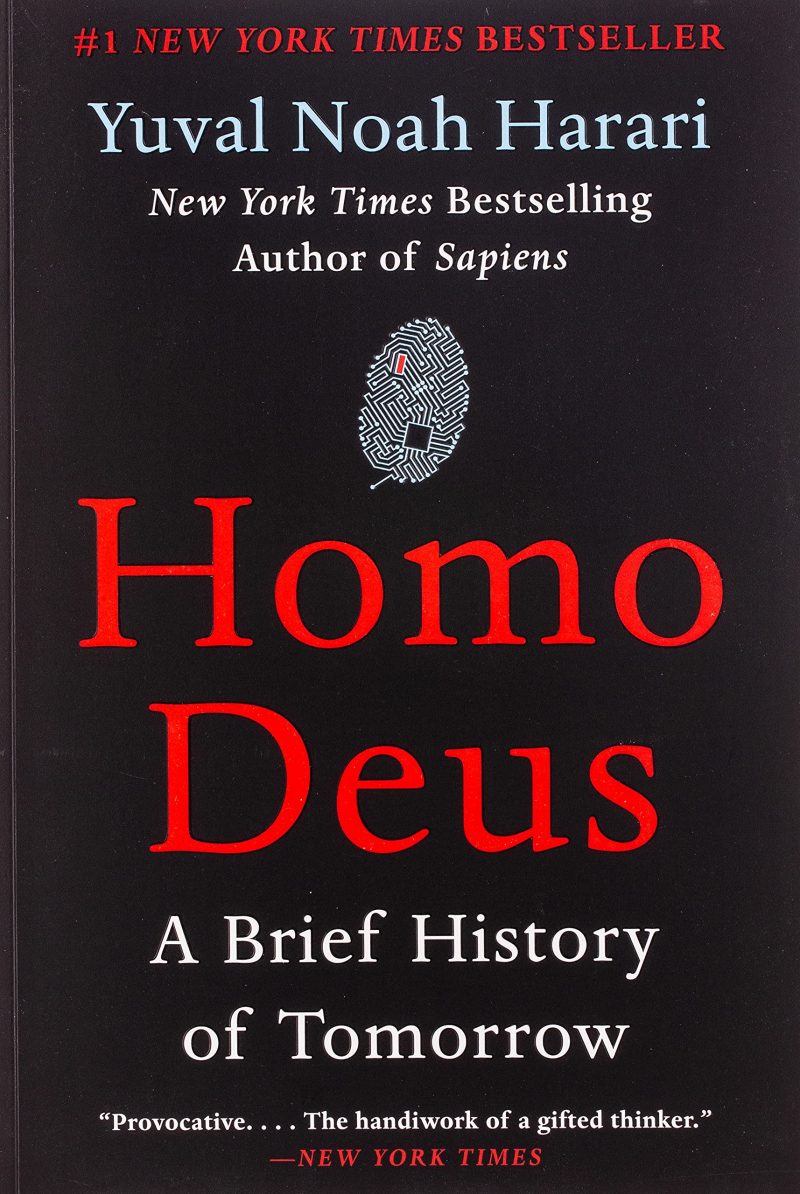
https://www.amazon.com/ 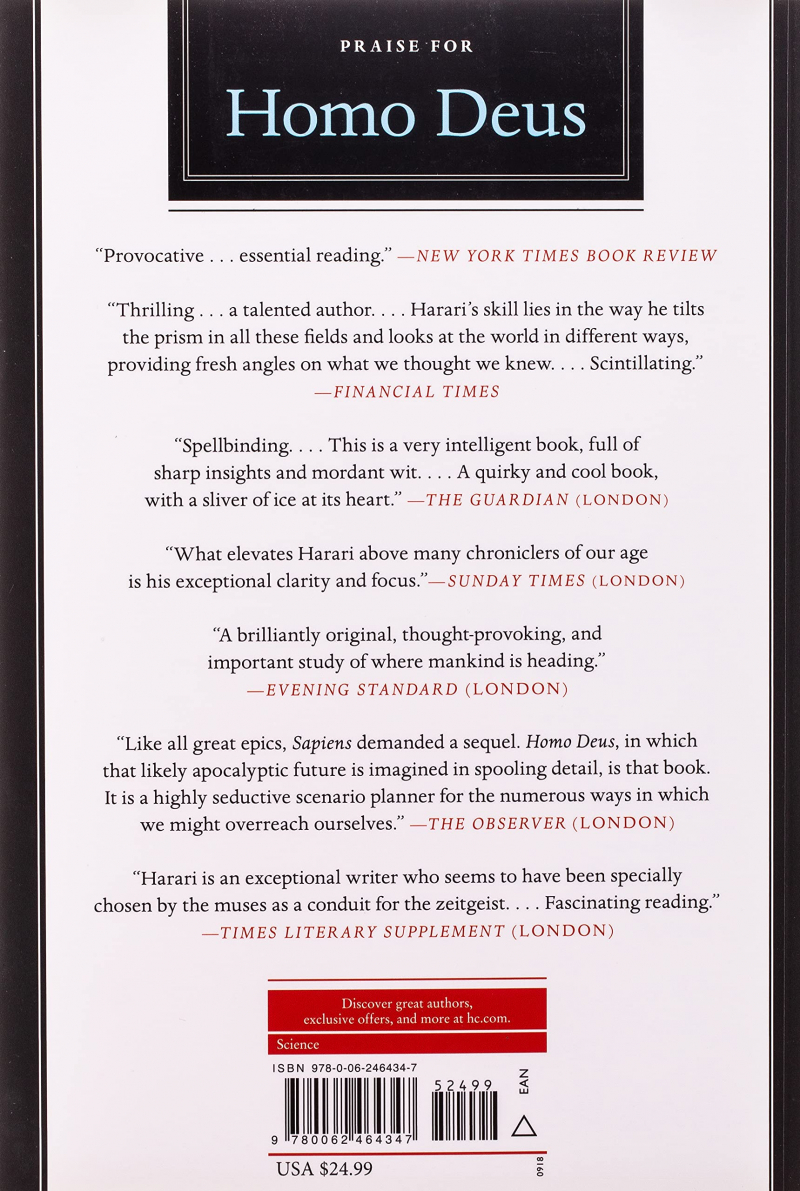
https://www.amazon.com/ -
Yuval Noah Harari earned a Ph.D. in history from the University of Oxford and presently teaches world history at the Hebrew University of Jerusalem. His earlier books, Sapiens: A Brief History of Humankind and Homo Deus: A Brief History of Tomorrow, were global best-sellers, selling over fifteen million copies and being translated into over fifty languages.
How do computers and robots alter what it means to be human? How do we deal with the fake news epidemic? Is it still possible to have nations and religions? What do we want to teach our children?
Yuval Noah Harari's 21 Lessons for the 21st Century is a deep and visionary inquiry into today's most pressing concerns as we enter unknown territory. As technology advances faster than our understanding of it, hacking becomes a military tactic, and the world feels more polarized than ever, Harari addresses the challenge of navigating life in the face of constant and disorienting change, and raises the critical questions we must ask ourselves in order to survive.
Harari expands on the concepts discussed in his prior books in twenty-one digestible chapters that are both provocative and profound, untangling political, technological, social, and existential challenges and offers guidance on how to prepare for a radically different future than the one we already live in: When Big Data is watching us, how can we maintain our freedom of choice? What will the future workforce look like, and how should we prepare? How should we respond to the terrorist threat? What is the source of the problem in liberal democracy?
Millions of readers have been captivated by Harari's remarkable ability to make sense of where we have come from and where we are heading. In this section, he challenges us to contemplate values, meaning, and personal participation in the midst of noise and uncertainty. Clarity is power when we are bombarded with irrelevant information. 21 Lessons for the 21st Century is necessary reading since it presents complicated contemporary concerns in a plain and accessible manner.
Author: Yuval Noah Noah Harari
Link to buy: https://www.amazon.com/Lessons-21st-Century-Yuval-Harari/dp/0525512195/
Ratings: 4.6 out of 5 stars (from 12534 reviews)
Best Sellers Rank: #6,452 in Books
#23 in History of Civilization & Culture
#36 in Cultural Anthropology (Books)
#330 in Politics & Government (Books)
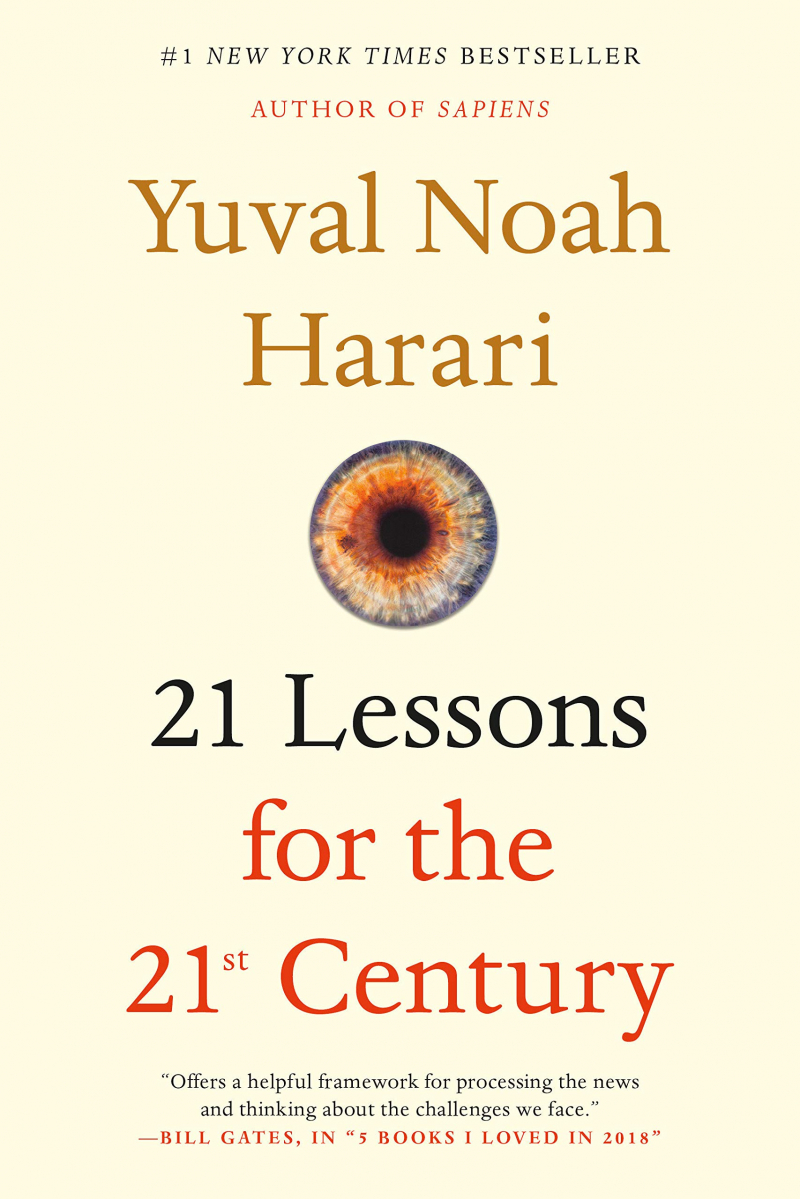
https://www.amazon.com/ 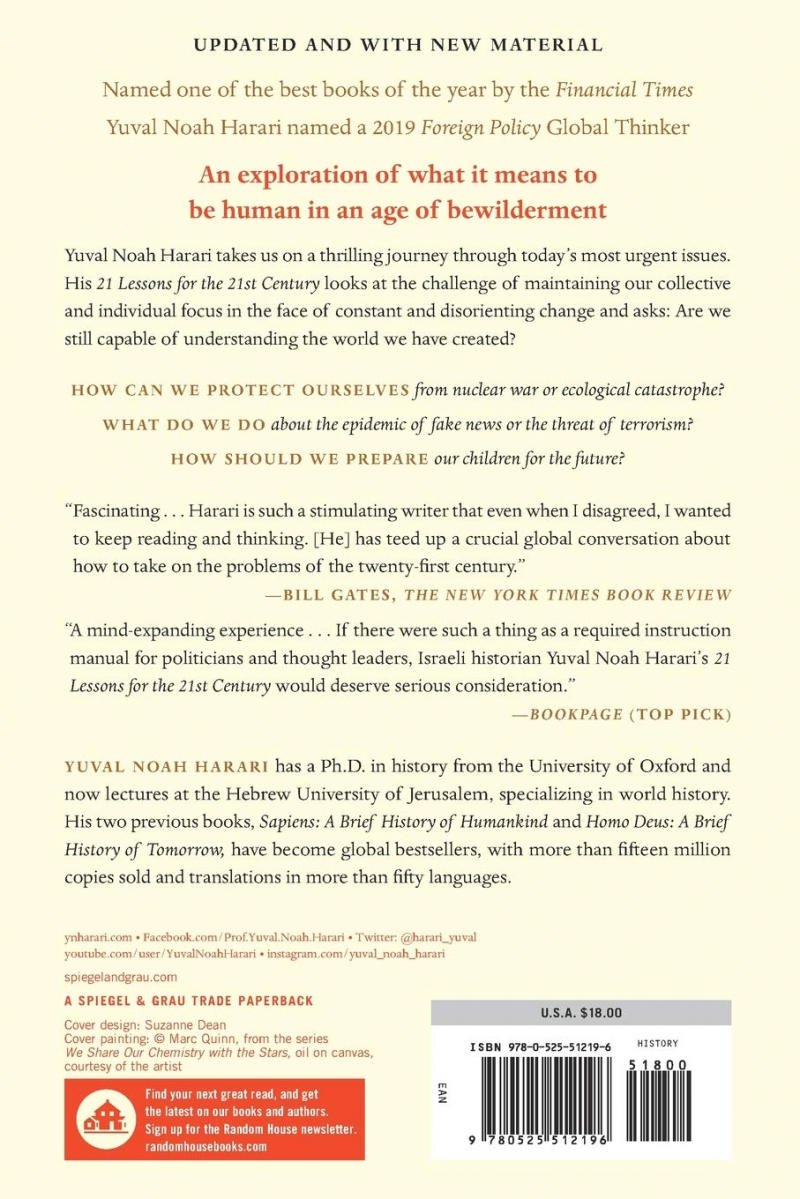
https://www.amazon.com/ -
PETER FRANKOPAN is an Oxford University historian. He is the author of The First Crusade: The Call from the East, a classic book on the eleventh and twelve centuries in Byzantium, Islam, and the West. He is a senior research fellow of Worcester College, Oxford, and the director of Oxford University's Oxford Centre for Byzantine Research. In 2009, his revised translation of The Alexiad was published in the United States.
Among the best books on cultural history, The Silk Roads is far more than a history of the Silk Roads; it is a revelatory new history of the globe, promising to unsettle ideas about where we came from and where we are going next. The huge territory reaching eastward from the Balkans across the steppe and South Asia has been thrown into the global spotlight in recent years, from the Middle East and its political turmoil to China and its economic rise. Frankopan reminds us that in order to comprehend what is at stake for the towns and kingdoms formed along these intricate trade routes, we must first comprehend their incredible histories.
Frankopan realigns our worldview, pointing us eastward. East and West initially met on the Silk Roads through trade and conquest, resulting in the spread of ideas, cultures, and faiths. The Silk Roads demonstrates how the fate of the West has always been closely linked to the East, from the rise and collapse of empires to the expansion of Buddhism and the arrival of Christianity and Islam, all the way up to the great wars of the twentieth century.
Author: Peter Frankopan
Link to buy: https://www.amazon.com/Silk-Roads-New-History-World/dp/1101912375/
Ratings: 4.6 out of 5 stars (from 4444 reviews)
Best Sellers Rank: #9,804 in Books
#8 in Historical Geography
#34 in History of Civilization & Culture
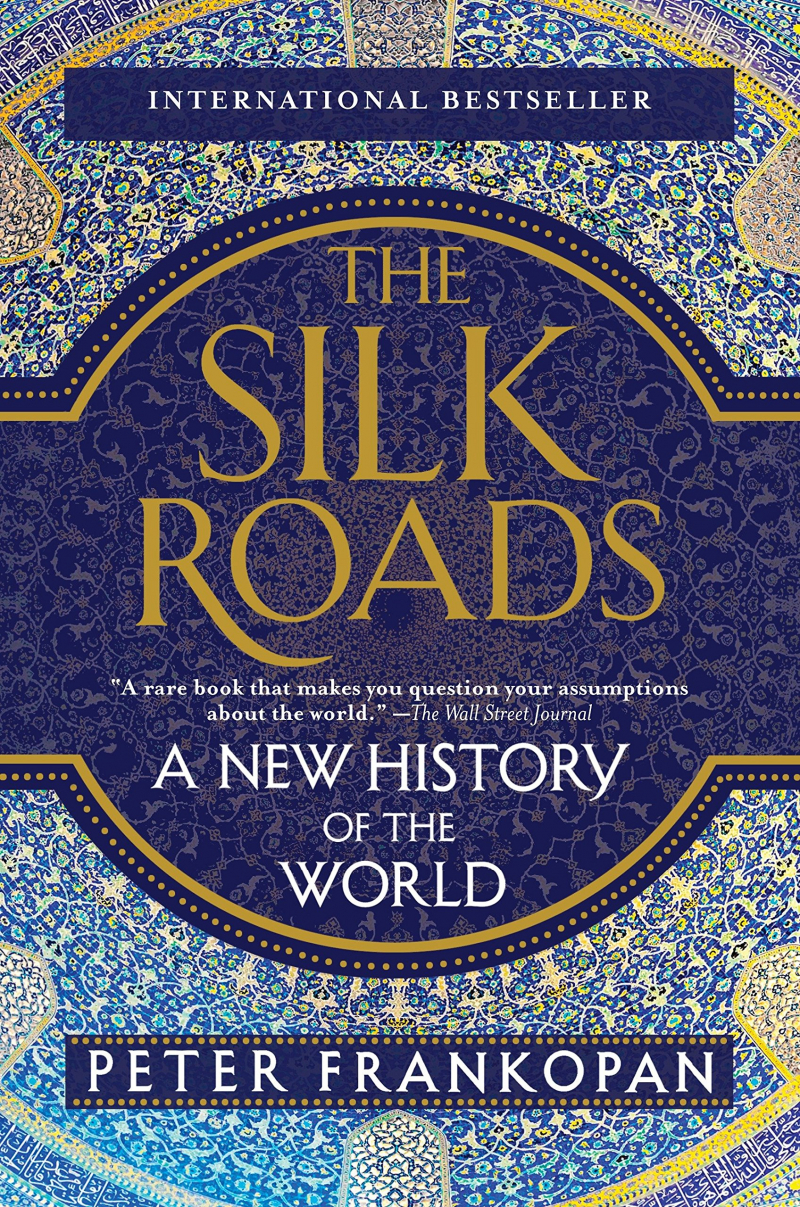
https://www.amazon.com/ 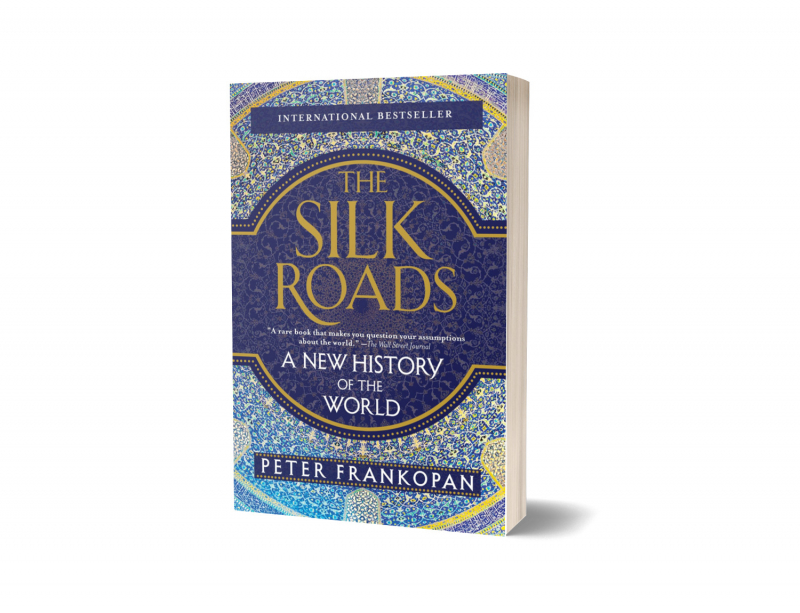
lazada.vn -
GRAHAM HANCOCK is the bestselling author of significant worldwide nonfiction books such as The Sign and the Seal and Fingerprints of the Gods. His works have been translated into thirty languages and have sold over seven million copies worldwide. His public lectures, radio and television appearances, including TV shows Quest For The Lost Civilization and Flooded Kingdoms of the Ice Age, as well as his considerable internet presence, have exposed his ideas to tens of millions of people.
We've been taught that North and South America were devoid of humans until roughly 13,000 years ago, making them among the last big landmasses on the planet to be colonized by our forefathers. However, fresh discoveries have fundamentally altered this long-held view, and we now know that the Americas were initially inhabited more than 130,000 years ago - many tens of thousands of years before human settlements were created elsewhere.
Hancock's study takes us on a journey and interactions with the experts behind the recent astounding advances. In the process, he uncovers that ancient "New World" cultures share a legacy of superior scientific knowledge and sophisticated spiritual beliefs with allegedly disconnected "Old World" tribes from the Mississippi Valley to the Amazon rainforest. Have archaeologists been too concentrated on the "Old World" in their hunt for civilization's origins, ignoring the revolutionary prospect that those origins could be located in the "New World"?
America Before: The Key to Earth's Lost Civilization is the culmination of everything that millions of readers have loved in Hancock's body of work over the years, including a mind-bending exploration of the mysteries of the past, amazing archaeological discoveries, and profound implications for how we live our lives today.
Author: Graham Hancock
Link to buy: https://www.amazon.com/America-Before-Earths-Lost-Civilization/dp/1250756952/
Ratings: 4.7 out of 5 stars (from 2926 reviews)
Best Sellers Rank: #10,404 in Books
#2 in Prehistory
#14 in Ancient & Controversial Knowledge
#19 in General Anthropology
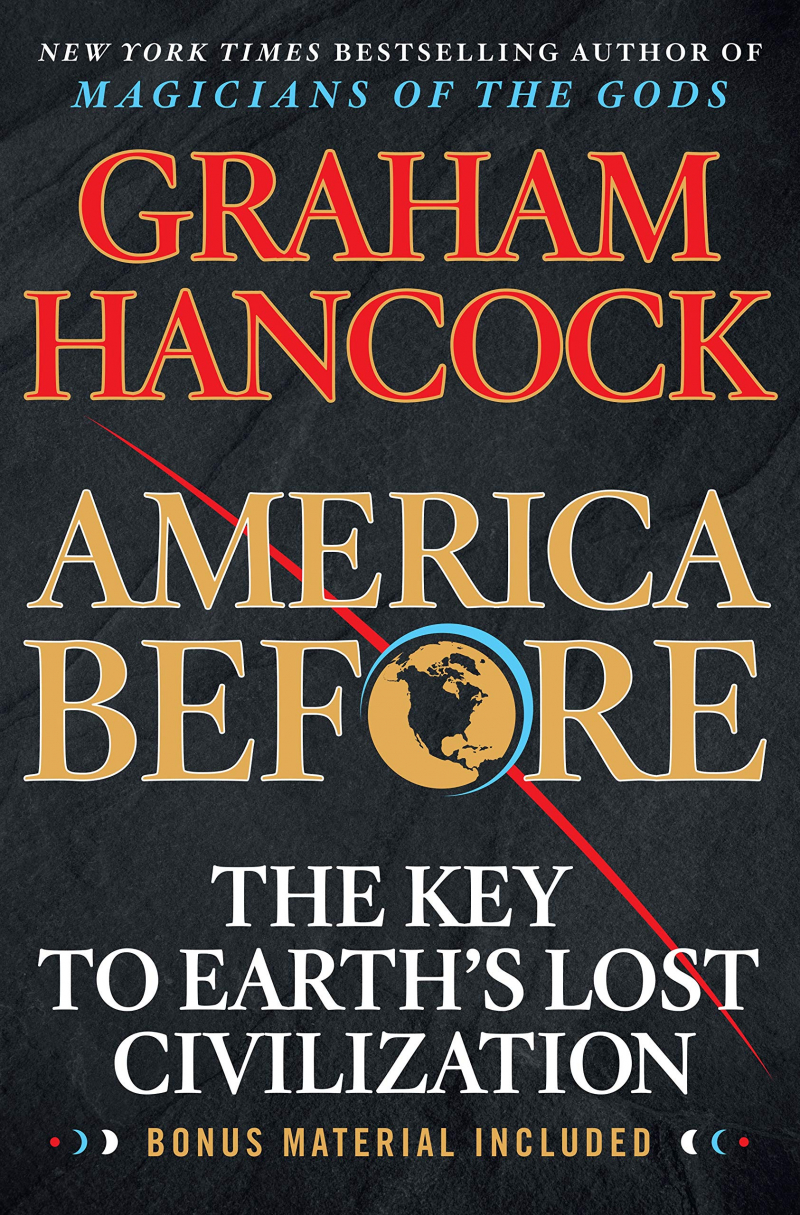
https://www.amazon.com/ 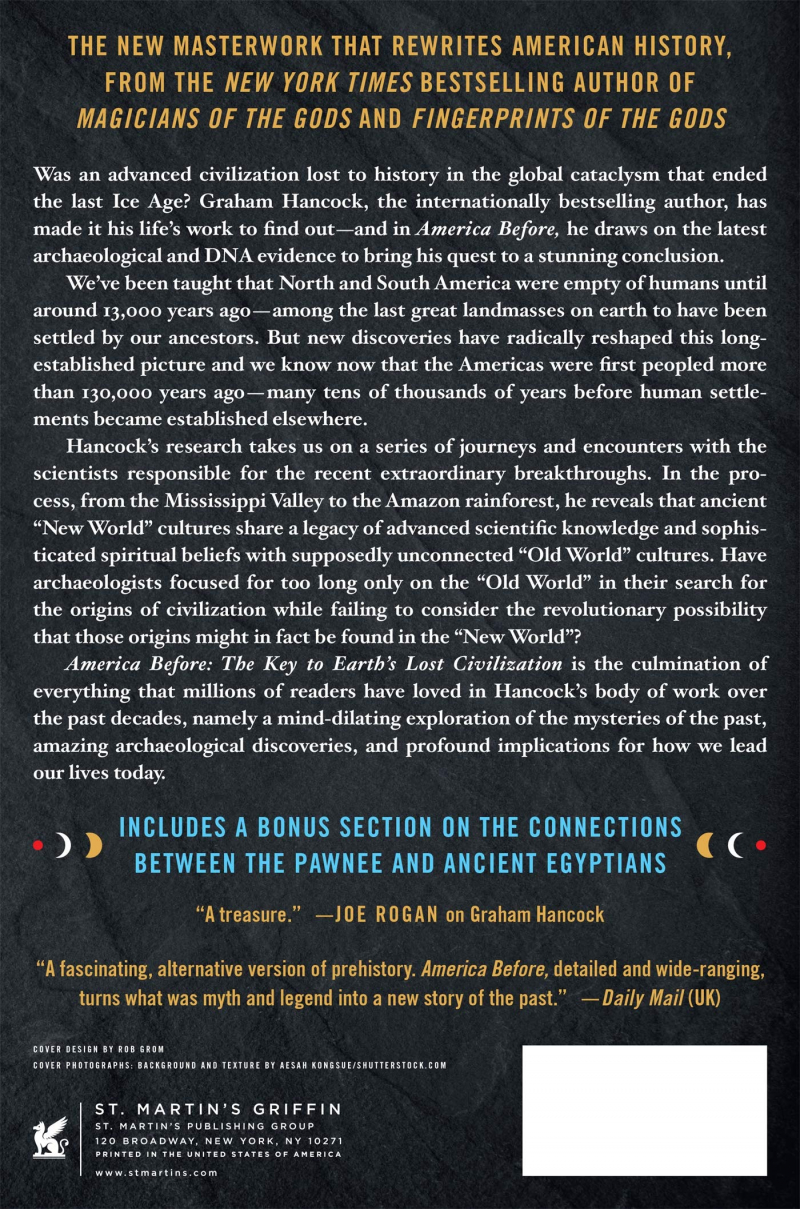
https://www.amazon.com/ -
Terence McLaughlin (1928-1980) earned a bachelor of science in chemistry and worked as a research chemist for Unilever Corporation, eventually rising to the position of company director. He then established a consulting firm and began publishing a series of scientific textbooks. Encouraged by his historian wife, Eve, he shifted his focus to authoring history and scientific books for the general public, eventually becoming an authority on public health and cleanliness. The current book (formerly titled Coprophilia) explores on humanity's relationship with filth and hygiene throughout history.
Terence McLaughlin, a public health and hygiene authority, dissects our attitudes toward the filth that has accompanied society throughout human history in this entertaining and often amusing exploration of life's faults. He believes that "dirt" is a matter of opinion.
Cultural views toward anything from workplace smoke to personal hygiene are constantly altering in response to economic and political pressures. McLaughlin offers Old Testament examples of cleanliness that, unbeknownst to the observant at the time, helped shield them from the plague. The legendary baths of ancient Rome were regarded as advances in personal hygiene, but were eventually ridiculed by Christians who condemned everything Roman.
McLaughlin shows how we accept or reject substances through a slew of fascinating instances. Dirt is required reading for everyone interested in how we shape our environment.
Author: Terence McLaughlin
Link to buy: https://www.amazon.com/Dirt-Social-History-Through-Abuses-ebook/dp/B09NN6WSG6/
Ratings: 4.7 out of 5 stars (from 171 reviews)
Best Sellers Rank: #16,798 in Kindle Store
#7 in Ancient Early Civilization History
#10 in History of Anthropology
#11 in Cultural Anthropology (Kindle Store)
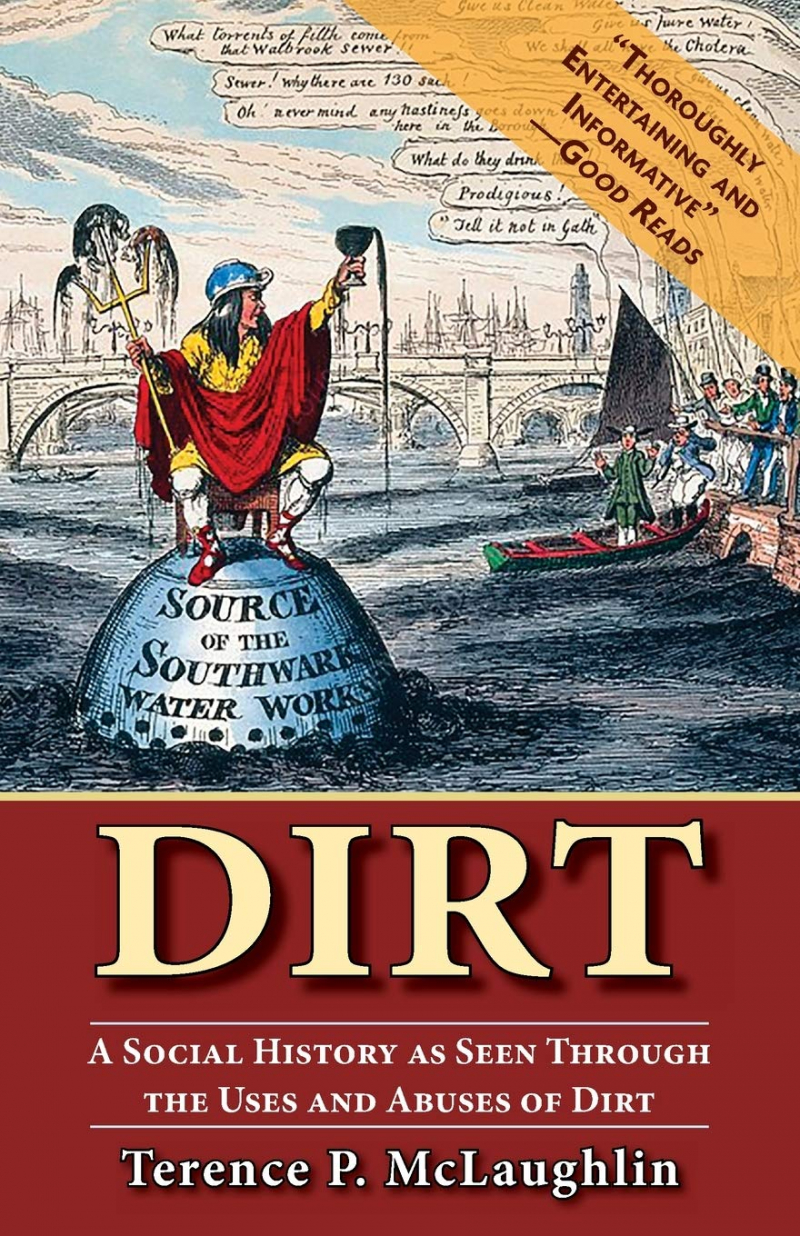
https://www.amazon.com/ 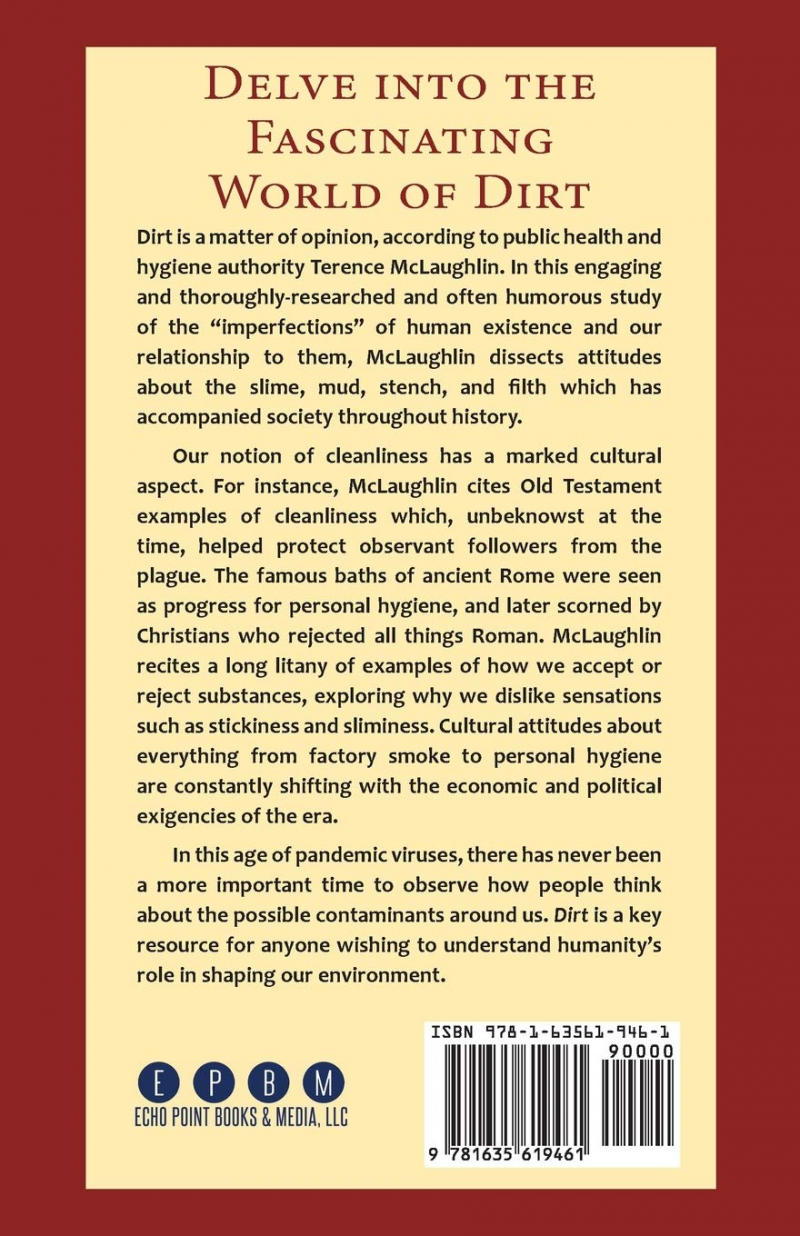
https://www.amazon.com/ -
One of Europe's most notable young thinkers is Rutger Bregman, a historian and writer for The Correspondent. His most recent book, Utopia for Realists, is a New York Times bestseller that has been translated into thirty-two languages. He resides in Holland.
If there is one concept that has brought together the left and the right, psychologists and philosophers, ancient and modern intellectuals, it is the implicit premise that people are terrible. It's a concept that inspires newspaper headlines and shapes the rules that govern our lives. The roots of this notion have penetrated deep into Western thought, from Machiavelli to Hobbes, Freud to Pinker. We're taught that humans are by nature selfish and driven primarily by self-interest.
What if it's not true? In Humankind, Rutger Bregman, international best-selling author, offers a fresh look at the previous 200,000 years of human history, arguing that humans are built for kindness, preferring cooperation over competition, and preferring to trust rather than hate one another. In fact, this instinct has a strong evolutionary basis that dates back to the origins of Homo sapiens.
From the real-life Lord of the Flies to the post-Blitz solidarity, the hidden flaws in the Stanford prison experiment, and the true story of twin brothers on opposing sides who helped Mandela end apartheid, Bregman demonstrates that believing in human generosity and collaboration isn't just optimistic—realistic. it's Furthermore, it has far-reaching ramifications for how society operates. When we imagine the worst of individuals, the worst of our politics and economy emerges. However, believing in the reality of humanity's love and altruism will lay the groundwork for achieving significant social change, a point that Bregman delivers convincingly with his trademark wit, refreshing frankness, and captivating storytelling.
Author: Rutger Bregman
Link to buy: https://www.amazon.com/Humankind-Hopeful-History-Rutger-Bregman/dp/0316418528/
Ratings: 4.6 out of 5 stars (from 5378 reviews)
Best Sellers Rank: #11,713 in Books
#21 in Sociology of Social Theory
#41 in History of Civilization & Culture
#54 in Cultural Anthropology (Books)
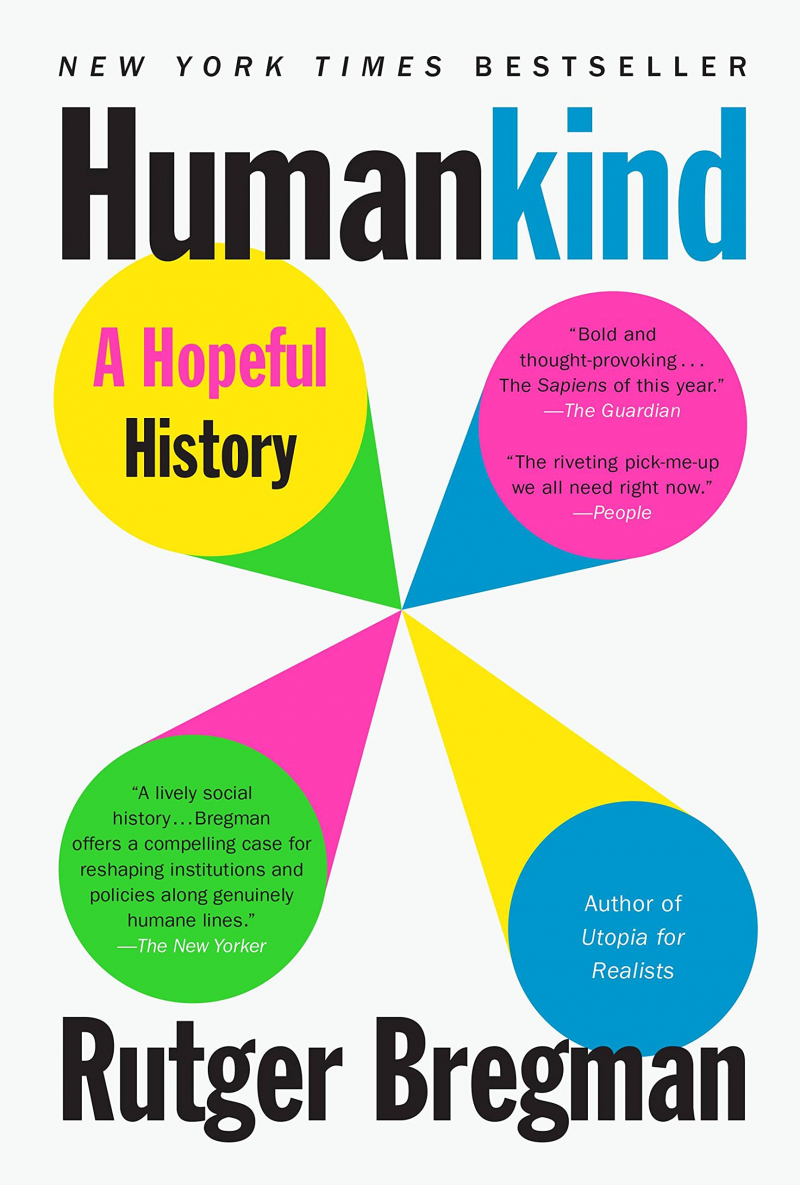
https://www.amazon.com/ 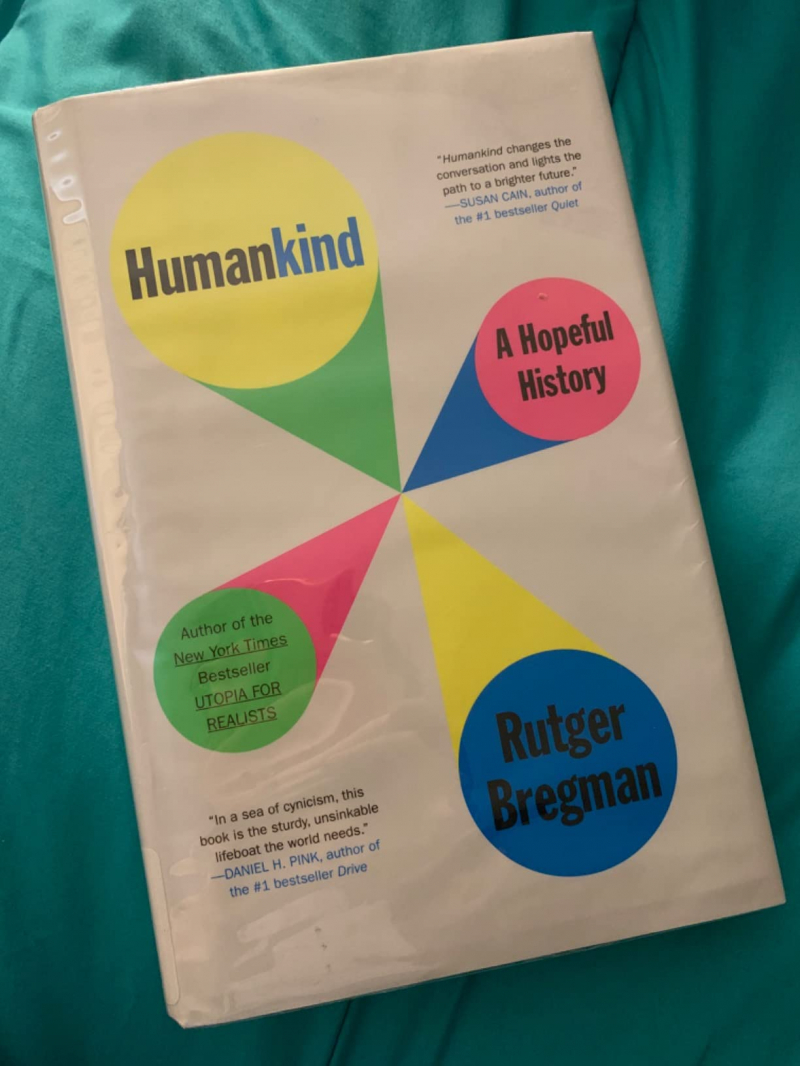
https://www.amazon.com/ -
The New York Times best-selling author of Cod, Salt, Paper, The Basque History of the World, 1968, The Big Oyster, International Night, The Eastern Stars, A Continent of Islands, and The White Man in the Tree and Other Stories is Mark Kurlansky. He was awarded the Dayton Literary Peace Prize for Nonviolence, the Bon Appetit Food Writer of the Year Award, the James Beard Award, and the Glenfiddich Award for Nonviolence. Salt was a nominee for the Los Angeles Times Book Prize. He worked as the Chicago Tribune's Caribbean correspondent for ten years.
Mark Kurlansky's fifth work of nonfiction focuses on salt, a basic household ingredient with a long and intriguing history. Salt, the only rock humans consume, has shaped society since its inception, and its narrative is a brilliant, often surprising component of human history. Salt: A World History, a precious substance that functioned as currency, affected the creation of trade routes and cities, sparked and financed wars, secured empires, and inspired revolutions. Salt is a wonderfully engaging, multi-layered masterwork populated by colorful people and filled with an endless sequence of fascinating details.
Author: Mark Kurlansky
Link to buy: https://www.amazon.com/Salt-World-History-Mark-Kurlansky/dp/0142001619/
Ratings: 4.4 out of 5 stars (from 2487 reviews)
Best Sellers Rank: #12,445 in Books
#3 in Mineralogy (Books)
#8 in Rocks & Minerals
#16 in Gastronomy History (Books)
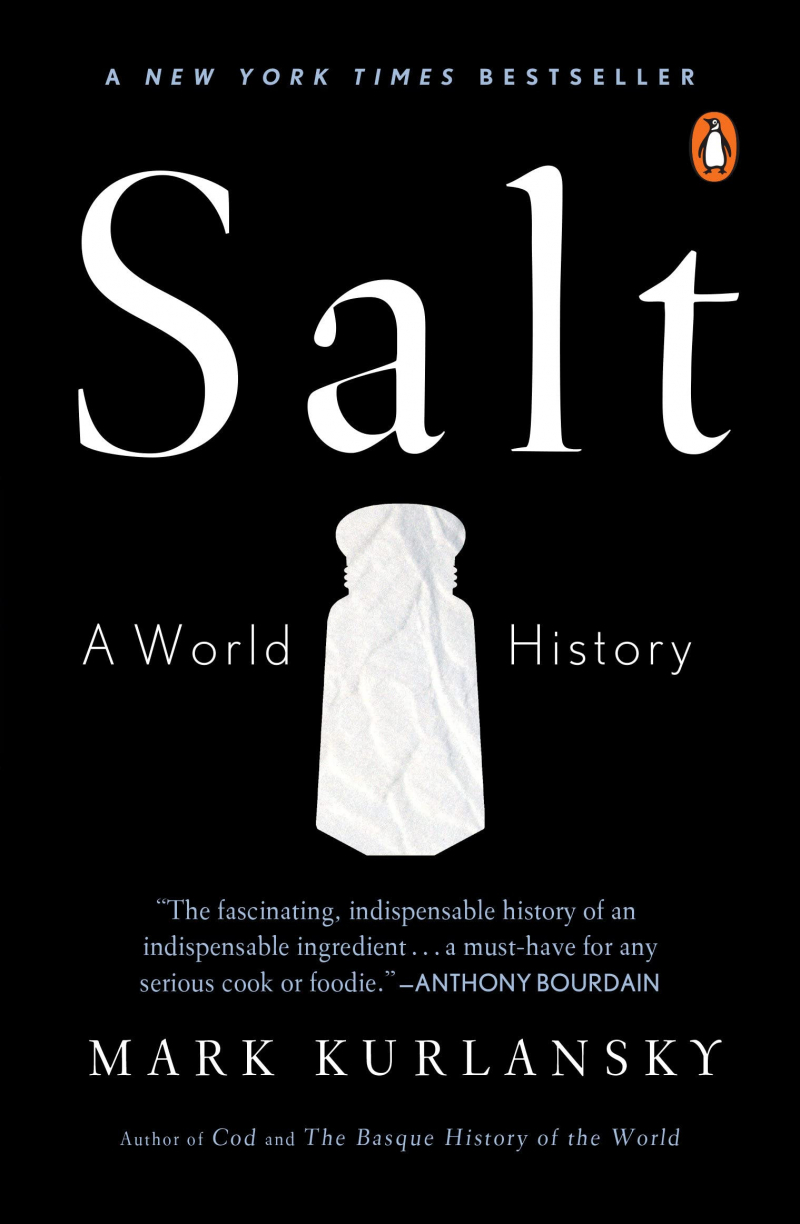
https://www.amazon.com/ 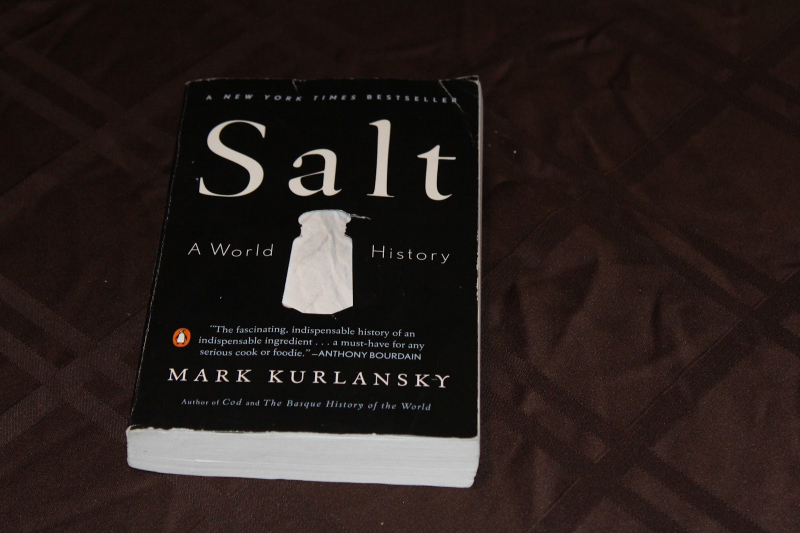
culinarypen.com -
Eric H. Cline is a classics and anthropology professor at George Washington University, as well as the director of the Capitol Archaeological Institute. He has dug and surveyed throughout Greece, Crete, Cyprus, Egypt, Israel, and Jordan as an active archaeologist. From Eden to Exile: Unraveling the Mysteries of the Bible is one of his many books, as is The Trojan War: A Very Short Introduction.
Marauding people known simply as the "Sea Peoples" attacked Egypt in 1177 B.C. The pharaoh's army and navy defeated them, but the victory damaged Egypt so much that it quickly fell into decline, as did the majority of the surrounding civilizations. The Bronze Age civilization world came to a sudden and violent end after decades of brilliance. Over the span of a few decades, kingdoms crumbled like dominoes. There will be no more Minoans or Mycenaeans. There will be no more Trojans, Hittites, or Babylonians. The prosperous economy and cultures of the late second millennium B.C., which spanned Greece, Egypt, and Mesopotamia, vanished, as did writing systems, technology, and massive architecture. However, the Sea Peoples alone could not have inflicted such widespread devastation. What caused that to happen?
Eric Cline tells the compelling story of how the end was brought about by various interconnected failures, ranging from invasion and insurrection to earthquakes, drought, and the closing of international trade routes, in this major new study of the reasons of the "First Dark Ages." He sketches a wide panorama of the Late Bronze Age empires and globalized peoples, bringing to life the lively multicultural world of these great civilizations and demonstrating how their very interconnectedness hastened their cataclysmic collapse and ushered in a dark age that lasted generations.
1177 B.C. is a compelling blend of narrative and cutting-edge scholarship that sheds new light on the complex ties that gave rise to, and ultimately destroyed, the flourishing civilizations of the Late Bronze Age and laid the groundwork for the emergence of classical Greece.
Author: Eric H. Cline
Link to buy: https://www.amazon.com/gp/aw/d/0691208018/
Ratings: 4.5 out of 5 stars (from 630 reviews)
Best Sellers Rank: #19,364 in Books
#9 in Archaeology (Books)
#22 in Ancient Roman History (Books)
#58 in History of Civilization & Culture
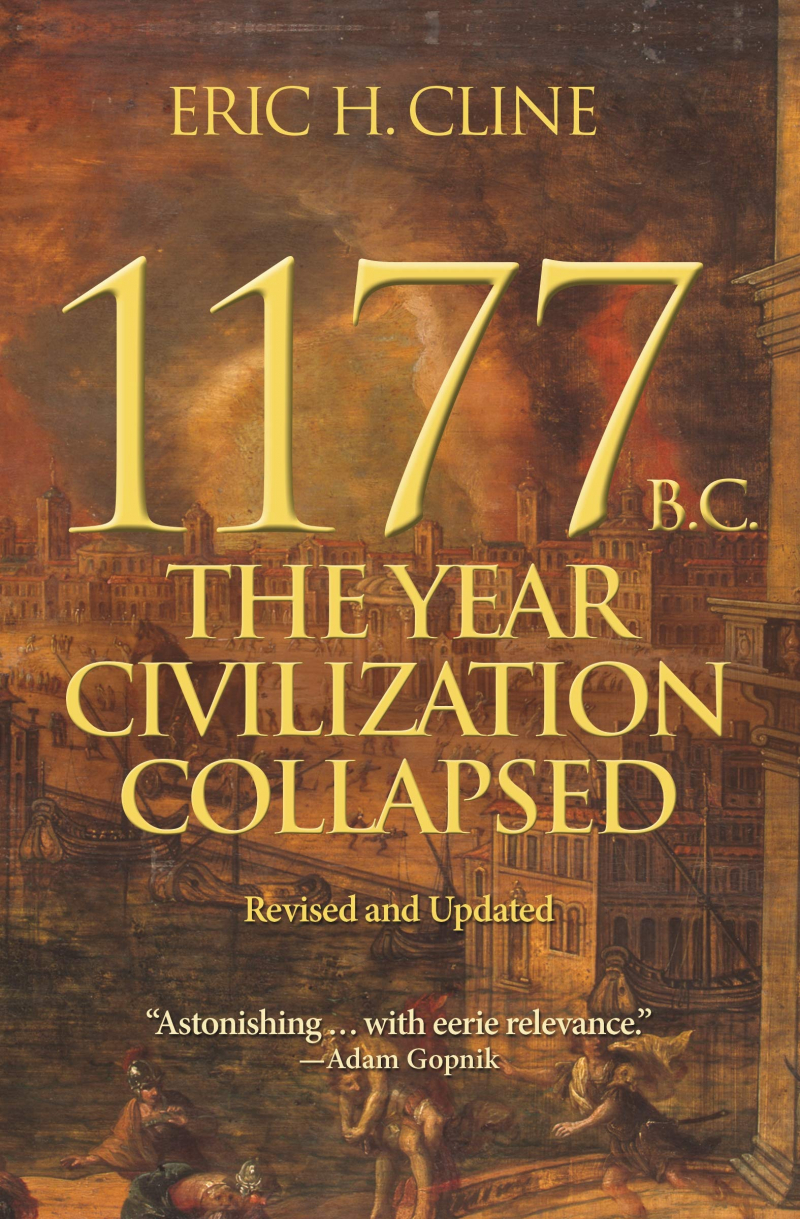
https://www.amazon.com/ 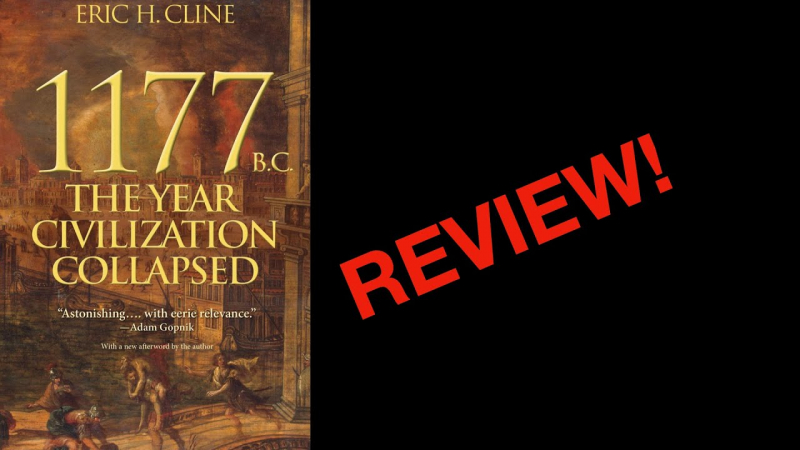
Photo: The Historian's Craft's Youtube Channel -
MSNBC, Fox News, CNN, NPR, The New York Times, The Times of London, Playboy, The Washington Post, Time, Newsweek, The Atlantic, Outside, El Pais, La Vanguardia, Salon, Seed, and Big Think have all highlighted Christopher Ryan, PhD, and his work.
Most of us have instinctive proof that the world is coming to an end: balmy December days, face-to-face dialogue replaced by heads-to-screens zomboidism, a world at war, a political system in chaos. Some myths and lies are repeated so frequently that they become true: Civilization is humanity's greatest achievement. Unquestionable progress has been made. Consider your blessings. You're fortunate to be alive right now. Perhaps we are, perhaps we aren't. Civilized to Death challenges the notion that progress is fundamentally desirable, stating that the "progress" that defines our age is akin to a sickness that is progressing.
Of course, prehistoric life was not without its hazards and disadvantages. Many babies died throughout their infancy. A broken bone, infected wound, snakebite, or a tough pregnancy can all be fatal. However, Christopher Ryan wonders if these pre-civilized risks were more lethal than modern scourges like car accidents, malignancies, cardiovascular disease, and a technologically lengthened dying process. Civilized to Death "will make you see our so-called progress in a whole new light," according to Book Riot, and adds to the important discussion that "the way we have been living is no longer sustainable, at least as long as we want to the earth to outlive us" (Psychology Today). Ryan asserts that we should begin looking backwards in order to find our path into a better future.
Author: Christopher Ryan
Link to buy: https://www.amazon.com/gp/aw/d/1451659113/
Ratings: 4.7 out of 5 stars (from 985 reviews)
Best Sellers Rank: #44,638 in Books
#40 in Social Philosophy
#50 in Natural Resources (Books)
#66 in Environmental Economics (Books)
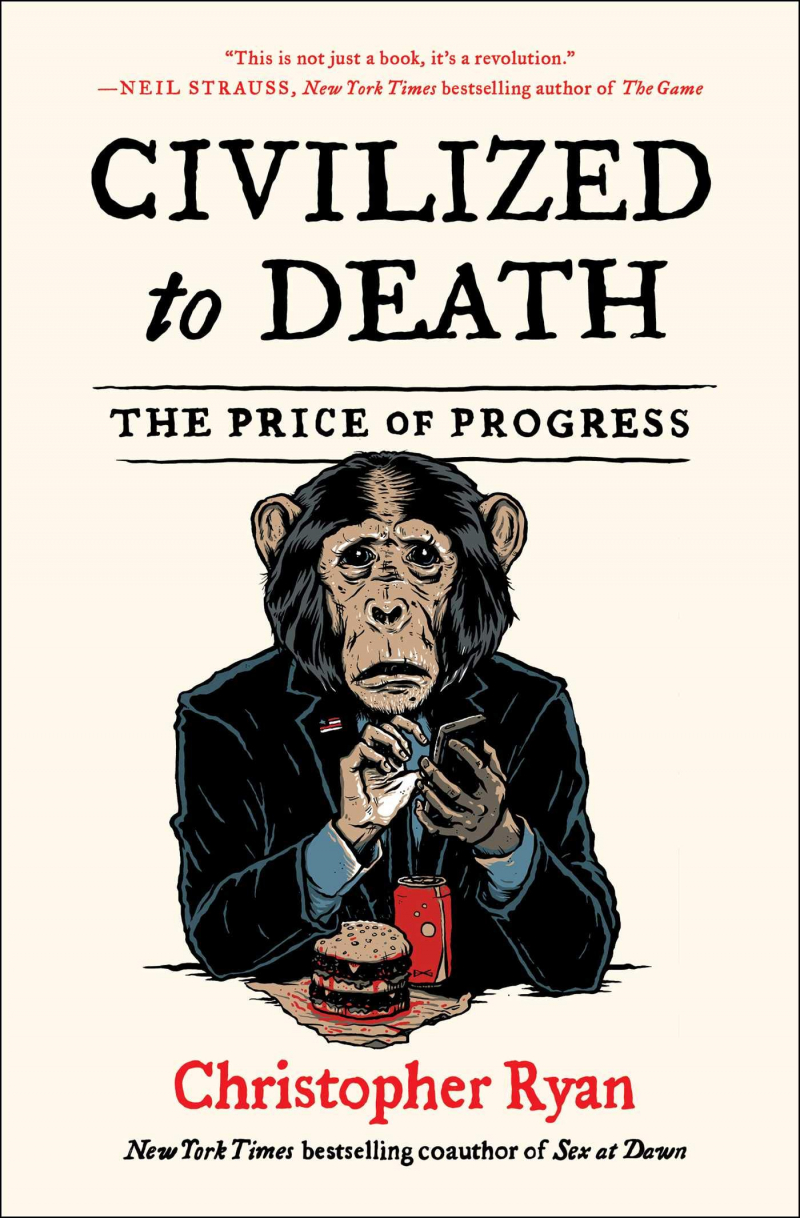
https://www.amazon.com/ 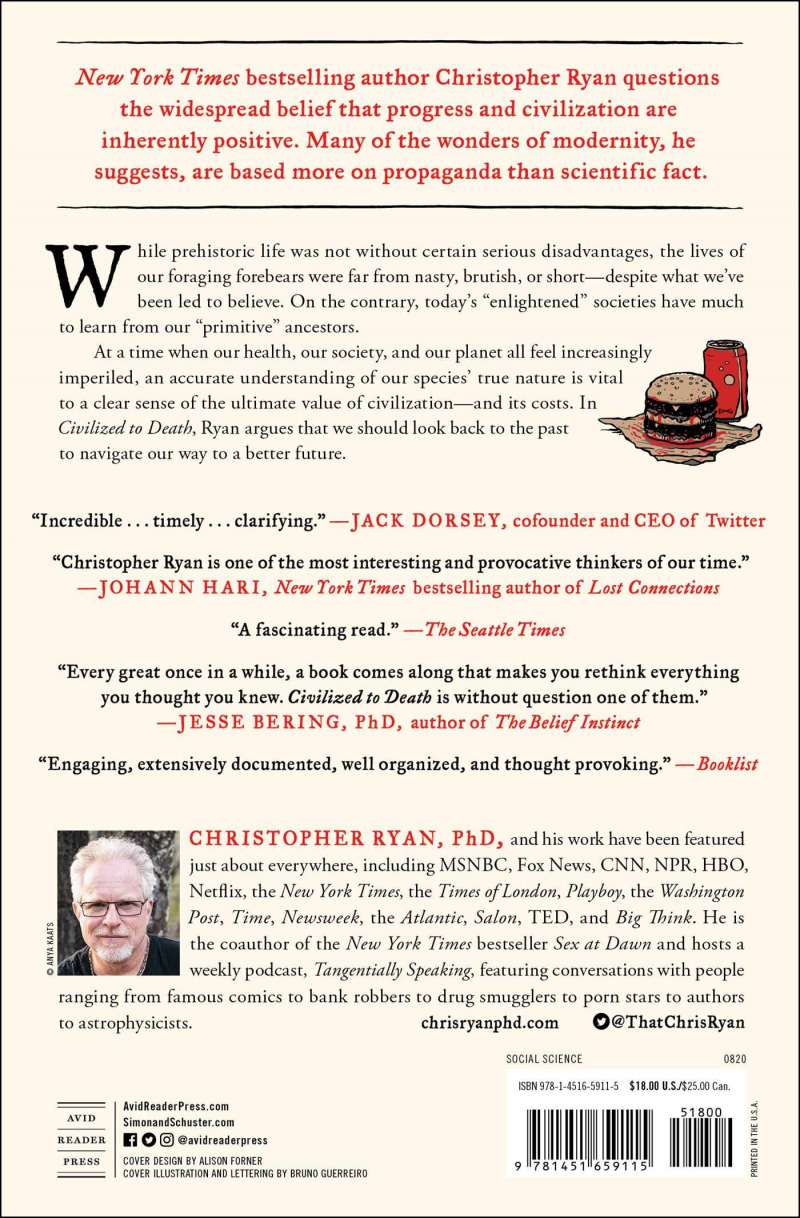
https://www.amazon.com/

















